#will probably have a balance of ~$1700 by the end of may
Text
A Selection of England’s Relationships Throughout History
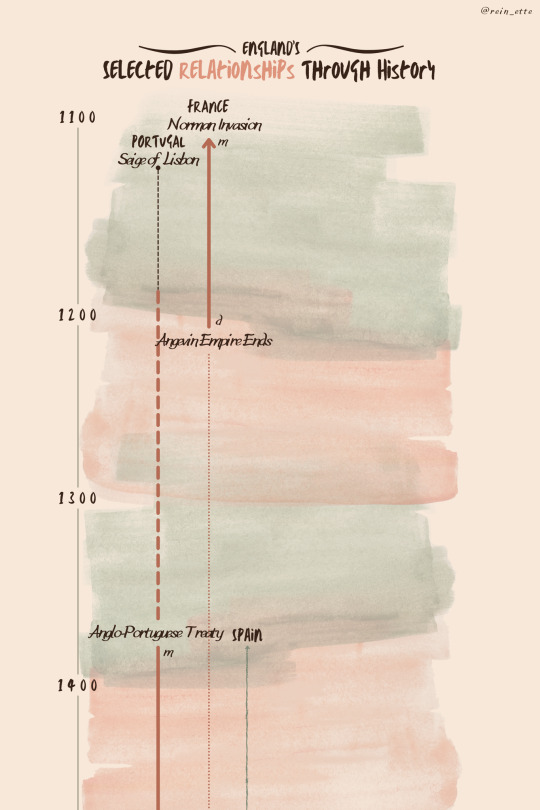
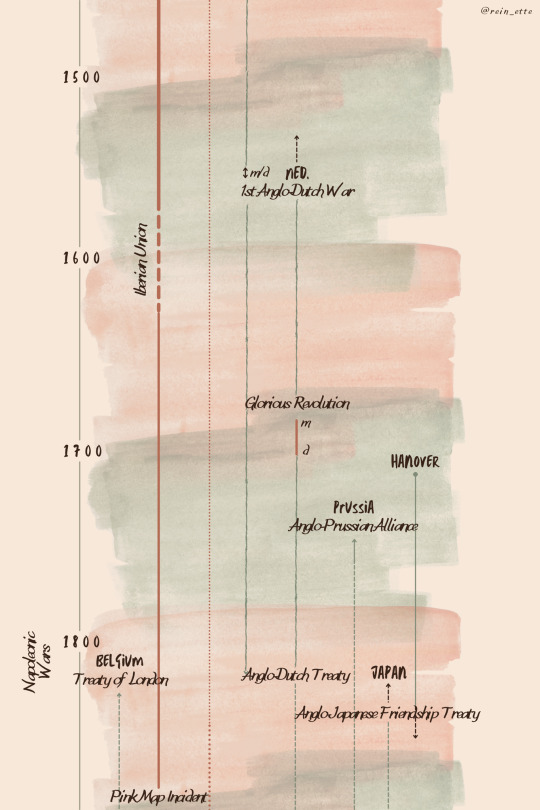
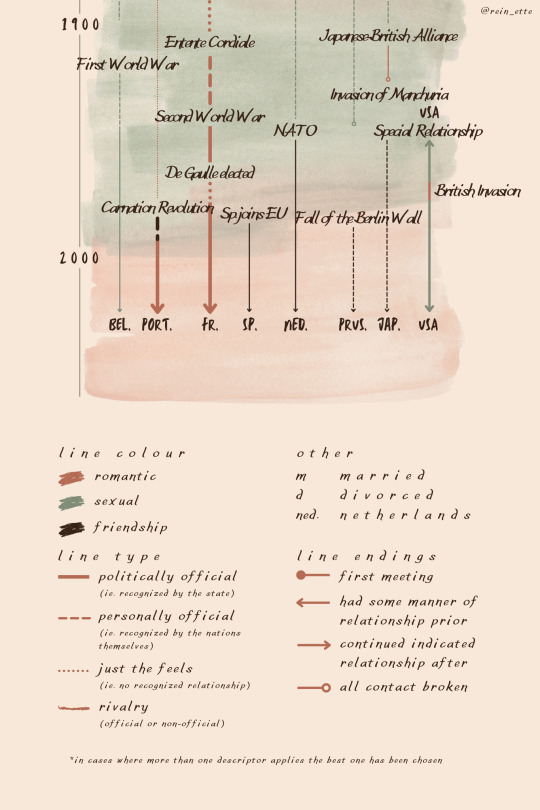
Holy this took me a long time BUT Hetalias back so gotta celebrate ♥️
Obviously these are my personal interpretations of iggy and co. — I would definitely love to hear feedback from anyone who agrees/disagrees or finds any historical inaccuracies.
Also I forgot to mention in the actual legend but the line thickness indicates the major relationship during England’s life at that time or the one he was the most invested in/committed to.
More Special Notes/Thoughts Under the Cut!
I use ship names throughout these notes only to denote a relationship between a nation and England, not necessarily a romantic one.
From a outsider point of view England’s relationship with Port and France are almost the inverse of each other, with one relationship growing stronger when the other weakens and vice versa, but actually from England’s point of view he’s just loved both of them, like, forever. For most of his life Portugal’s political agenda just happened to align better with his, so naturally more time was invested there. But I don’t think that made his feelings for Francis any less profound or intense during that time, and vice versa when he was dating France in the 20th century. Nowadays he’s allowed to do whatever he wants.
Also you actually draw the lines you really realize how long England’s been obsessed with those two amdkfjsjbdjdd
Nedeng and Engbel are so under-appreciated even though they’ve also shared the channel for like, forever? Ned had a reAl intense rivalry going on with England in the 16 and 1700s that could give Spain a run for his money — but to me the difference between SpUK and Nedeng is that the latter is actually has a more mutual respect/kinship undertone that Spain can’t share with England. Those two were born into similar conditions (dirt poor), have somewhat similar mindsets towards success (requires ruthless pragmatism and self discipline), both hate Spain and kinda France, and both like the ocean and the thrill of the more dangerous, darker aspects of life. That’s the foundation for a pretty darn strong friendship, despite the little tiffs in the middle.
I like to think Bel had a huge crush on England during the Napoleonic Wars and into the 19th century. I mean, if there’s ever time to fall in love with England, it’s during the Victorian era. Plus I think a relationship like that would balance out well the image of England as “undesirable” and “unattractive” and Bel as just the little sister foil to Ned. She has needs and wants too, and if she wants the worlds most powerful empire you best believe she’ll have him 👀. Now Eng and Bel are friends with occasional benefits.
I also think the idea that England was isolated and had no deep friendships/relationships beyond whoever he’s shipped with is inaccurate. Arthur’s definitely an intensely private and independent person, and he himself does fall into the trap of believing no one cares about him and that everyone who does try to get close wants him for something. But historically there are many nations who admired and liked him. Much of Prussian aristocracy, for example, could be categorized into “Anglophiles” or “Francophiles” and while Prussia himself is best friends with Francis, it makes sense for him to also be really close with England. In fact, historian Barbara Tuchman described the German ambassador to Britain in 1914 as being torn apart by the thought of conflict between “the country of his birth and the country of his heart.” The German people probably would not have felt as strongly, but I also see Prussia as more closely linked with the military/aristocratic class than the common people after Unification, especially since most of Germany as we know it today was decidedly not Prussian. Essentially Pruk like Nedeng is another pair that share some pretty powerful core values, including a strong, sometimes overwhelming sense of responsibility and loyalty to those they see as “entrusted” to them.
While talking about Germany, we’re actually all sleeping on England x Hanover. This was England’s longest official marriage (the Anglo-Portuguese alliance was mostly about informal commitments) and the Hanoverian House produced Iggys beloved Queen Victoria. I have to do more research here to better characterize Hanover, but I do think this relationship would have had a measurable impact on Arthur, even if it wasn’t romantic in nature (which it probably wasn’t, as the power imbalance between England as an empire and Hanover as a German province was just too great)
Asakiku is another fascinating relationship, not least because cross culture Europe x Asia relations are scarcely explored. Asakiku has so much potential for straight fluff and Arthur and Kiki just vibing about literature and music and the meaning of life, but also lends itself to analysis of more serious questions: how racism might affect nation’s personal relationships, or how nations view human rights abuses, expansionist war and those who perpetrate them, including themselves. Of course these are topics that Arthur could discuss with others like Francis or Prussia, but I think he wouldn’t be as vulnerable, calm, or reflective with anyone but Kiku — ironically because Japan and England’s politics, culture, and history are more distant.
Finally, SpUK and USUK. I feel kinda bad for tagging these cuz a lot of people love these pairings, but while I think Al and Toni both play huge roles in Arthur’s life, it’s not really romantic in nature. Besides Port and Francis Arthur’s known Toni the longest, and they make a great pair because on some levels they get each other, but on others they contrast hard (optimist vs pessimist, faith vs reason, belief in fate vs belief in agency etc.) That makes them great foils for each other but not really great long-term lovers. As for USUK I see it mostly as platonic — there may be no one in this world Artie loves more than the Al, but love can be powerful without being romantic. I do think they tried it out in the 60s during the British Invasion (see The Chosen End series) but ultimately they also have irreconcilable differences in worldview that mean they can’t really be what the other needs in a lover.
#hws england#engport#fruk#usuk#spuk#engbel#nedeng#asakiku#pruk#haneng??#that’s not a thing#but it should be#aph Hanover#sorry this got LONG#my hcs
292 notes
·
View notes
Text
Mid of the year Naruto fandom stats
At the beginning of 2020 I made some stats regarding Naruto fandom dynamics (to be found here), and the trend wasn’t very optimistic - a steep, steady decline on ff.net, maybe somewhat balanced out by a rise of AO3. Probably unavoidable state of a fandom 6 years after the end of the canon...
But then I saw really LOTS of fics appearing on AO3 over past few months, and it prompted me to check the numbers (even though the year is only in the middle).
And, there was a big, an uncharacteristically big rise on AO3. I went to check ff.net, thinking that it probably died totally and all the traffic shifted to AO3 (and that’s a reason for the unprecedented rise), and to my amazement ff.net rose as well!!!

In May and June there were ca. 1700 and 1520 fics (+/-20), respectively, published on AO3. And, for the first time since mid-2018 ff.net broke the thousand fics per month mark, with ca. 1050 fics in May and ca. 1000 fics (+/-25) in June!
What’s happening? Naruto fandom, you’re on fire!!!
No, but seriously, does anyone have an explanation for that?
And since the data were collected for January-June 2020, it is very easy to extrapolate (multiply by 2, lol), and if we assume the trend will continue, there will be an increase by the end of the year!!! The first increase since 2013!!!
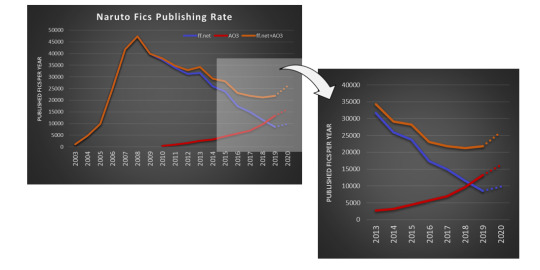
Yay!! Go Naruto Fandom!!! Go!!!
56 notes
·
View notes
Text
Pink Flowers // Fukumori
Mori had his feelings for Fukuzawa cut out of him years ago. Hanahaki AU
Word count : ~1700
CW some blood, one murder, one medical malpractice
When they’re younger, when they’re still a doctor and his bodyguard, Mori is the target of many attempted murders and kidnappings.
Despite his constant misgivings about bodyguarding, despite the simple fact that Mori doesn’t, actually, need any kind of rescuing, Fukuzawa comes for him.
Every single time.
Then they fight together, back to back, as a team, against threats to the fragile balance of Mori’s world, of the neutrality of his underground clinic.
It’s during those fights that Mori realizes than yes, sometimes he needs Fukuzawa by his side, and that he enjoys his company. They collapse, letting themselves fall sitting on the ground, side by side, bloody and tired.
Mori sighs and there is a tingle in his throat.
He doesn’t think much of it, barely notices it, but he does feel the beginning of a fondness for the man.
+
The itch at the back of his throat takes months to turn into a full cough, and he spits out the first petal in his own sink, thankfully.
Having a patient around while he discovers his own illness would be less than ideal. Rumors go fast in the underbelly of Yokohama, and if the news escape his office it’ll quickly make its way to his enemies.
He picks it up and studies it carefully.
“How bothersome,” he declares, throwing it in the trash.
But what can he do about it?
There are several things he can do, in fact.
First option — kill Fukuzawa before this disease takes a hold of him. But it’ll upset Natsume, and he isn’t sure he is capable of killing his bodyguard.
Second option — get rid of the feeling altogether. While this is something he can eventually do on his own, letting it fade, an operation would be a sure way to fix the issue. The problem: he can’t operate himself.
Third option — seduce the man. Make sure that what Mori apparently feels for him is returned. Keep him by his sides, for good.
This thought is infinitely more appealing than the first two.
He doesn’t have to decide immediately. He doesn’t want to.
“What do you think, Elise?”
She looks up from her picture book. “I think you’re gross.”
His laughter makes him cough again. Another petal comes out, and he thinks of every possibility again. He thinks of Fukuzawa, of the flowers fading from his lungs as the man holds him close.
He’ll cross that bridge when he gets to it. Hanahaki isn’t a kind illness, but it’s considerate enough to make the killing slow.
+
Elise doesn’t start looking worried until a few months later, when he wakes up gasping for breath, petals sticking to the back of his throat and spilling out of his mouth.
Her reaction tells him the situation might become critical soon.
It’s more anger than worry, to be fair, and she throws some of his tools to the ground in a fit of rage. “Just kill him!” she yells, before crossing her arms and setting her face into a pout. “I’m starting to feel sick too, so get rid of him before he kills the both of us.”
He would, usually, cave in to whatever Elise demands of him. He loves her, after all, and anything she wants is worth getting for her.
But not this. This is something he can’t give her.
+
By the time Fukuzawa finds out about Yosano, Mori is throwing up whole flowers. It’s starting to affect his work, but it doesn’t look like Fukuzawa has noticed.
If he has, he hasn’t said anything about it, which is fine by Mori.
They fight — of course they fight, but it’s not like they usually do.
Everyday fighting is banter and annoying each other, it’s Fukuzawa coming for him every time he gets into trouble, no matter how much he doesn’t need it.
Everyday fighting makes the flowers in Mori’s lungs grow larger. It makes Mori want this man to love him.
His chest tightens, thinking about what they have the potential to be, about how much they could do for this city just by being together, about the kind of embrace he could give him.
Fukuzawa draws his sword, and Mori almost chokes, swallowing down the flowers threatening to fall from his lips.
There is no fixing it now.
+
Their partnership broken, the illness gains more ground, with no hope of recovery through more...traditional means.
It quickly becomes urgent to do something about it. The flowers are larger than ever, and if he was a lesser man, he would cry thinking about what they could have been, he would go back to Fukuzawa and ask him to reconsider, to come back to him.
Gritting his teeth, he closes his eyes, grieving for a relationship that doesn’t exist, which was doomed from the day he threw up that first petal.
He is not a lesser man, however. He shoves his own fingers down his throat to drag the flowers out. They clog the sink, bloodied and of a horribly cheerful pink color.
How those feelings have made him weak. They make him sick with a deadly disease, shift his focus, make him yearn for something he knows he can never have.
He needs to get rid of them as soon as he can.
“Look at you!” Elise scolds him. “I told you, we should have killed him.”
“I’m sorry Elise.” He smiles at her sheepishly, because she is right. He should have dealt with it a long time ago. He just hadn’t wanted to.
They make him irrational.
There are other underground doctors in the city, though none of them as skilled, none of them as reputed, as he is. He will find someone to take care of it.
She scowls, eyebrows drawing together, and she tugs at his sleeve. “You’re so stupid, Rintarou.”
+
The other doctor is surprised to see him, of all people, but he gets to work quickly. He looks smug, knowing such a thing about Mori Ougai, about the weakness taking over him.
He will use it against him, in the future, if he can.
Mori doesn’t let him entertain the idea.
He refuses any kind of anesthetics, unwilling to put himself at the mercy of another person with a scalpel, and Elise stands guard. The other doctor underestimates her, but Mori knows she can recognize any suspicious medical action and rise up to protect him with barely any prompting.
The doctor opens him up and fixes him, and the pain means nothing when he’s finally getting rid of the feelings he has for Fukuzawa Yukichi, for they have been weighing on him since the beginning, far more than he ever admitted to.
When it’s done, he’s both curious and satisfied to realize that what he feels is now little more than indifference. Everything he has wished for since the start, to have him standing by his side, for lips on his skin and to be the only one in his eyes, seems ludicrous now. A waste of time and energy.
He cuts the doctor’s throat once he’s done and looks for any witness. Then, he puts Fukuzawa out of his mind, and moves on.
His work won’t do itself. He has a Mafia boss to take care of.
Time to get down to business.
+
"It’s a pity.”
Blood seeps out of Fukuzawa’s neck, and Mori is regretful, surprising even himself, though it’s not as personal as it could have been, once.
His feelings for Fukuzawa were cut out of him years ago.
Without this virus, they could have been a team again and crushed those rats with ease. They were always a deadly combination, so this is nothing but a missed opportunity.
But first comes the security and well-being of his own, and any feeling he allows himself those days is for them, for the Mafia — and for Elise, of course, but she is something else entirely.
He still apologizes for cheating. He may not love the man anymore, but he respects his strength and a fair fight would have ended in Mori’s defeat. It’s not something he can allow again, not with so much at stake.
All he needs now, is to wait for Elise to pop back up into existence, stay here until Fukuzawa dies — it’s the least he can do for his old teammate — and prepare for the rage of the Detective Agency.
Until Natsume shows up to scold them and drags them away to Dostoievski’s hideout.
Later, as they’re on their way, it’s plain in the way Natsume looks at him that he knows. Mori doesn’t care. He has done what needed to be done.
Elise reappears soon after, and he gives her a hug that she pretends to protest to. She will always be the most constant thing in his life, the only one who he knows will stand by him until his last breath.
+
The virus fades, and the ability user at the origin of it tries to run. Fukuzawa and Mori grab him before he can, together, like old times.
It makes Fukuzawa nostalgic, in a sense. He misses the team they used to be, before they each took a different walk of life. Before he learned of Yosano.
A part of him wishes that, when this is over, when they have won against Dostoievski, they can stay this way — a little bit of a team, again.
He wonders what Dazai is planning, forcing Akutagawa and Atsushi together.
Both boys are like rough diamonds, and Dazai is playing a dangerous game, hitting them against each other like this. There is little he can do but trust Dazai’s judgement and hope the sparks he makes don’t start too big of a fire.
Though, knowing him, he would probably say it’s the point.
Mori, he can tell, is thinking the same, though he doesn’t speak of it. He catches him glancing at the pair, eyes lingering on Atsushi, and Fukuzawa can’t blame him for it. He’s just as doubtful of the black-clad young man with whom his subordinate already seems to have a quiet understanding.
The Mafia leaves. Fukuzawa watches as Mori’s red scarf billows in the wind.
There is an itch in his throat.
90 notes
·
View notes
Photo
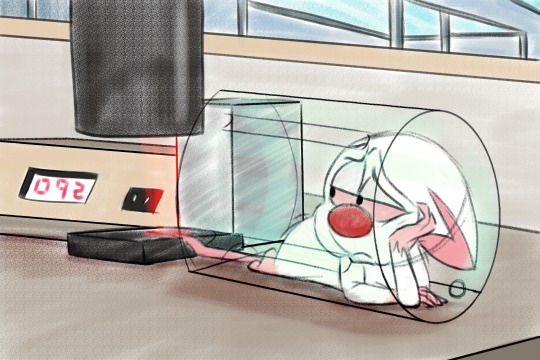
- PINKY AND THE BRAIN - EXPERIMENTS -
Below the cut is a personal project on the much more morbid side. Animal lab experimentation is always something I’ve found equal parts horrible and fascinating. Once in a blue moon, I’ll do research on the subject out of curiosity and/or for storytelling purposes. Even as a kid, I found this of interest, and when watching Pinky and the Brain I was always a bit disappointed that we never saw more of what the characters actually went through in the lab during the day. Granted, there’s a reason as to why this was never shown, as a child audience had to be kept in mind, yet still I pondered about it....
Over the last few days, I’ve been churning out compositions based on internet findings -- old and new experiments that rats and mice are put through, many of them humane, some of them very much not. It was an eye-opening journey for me artistically and otherwise, discovering what I’m comfortable drawing and what I never want to sketch again, as well as learning more about this realm of the scientific world.
WARNING: SOME GRAPHIC CONTENT BELOW THE CUT. If needles, patients dealing with the effects of cancer, and general portrayals of pain bother you, I wouldn’t bother venturing onward. I not only drew out experiments that the characters might have gone through, but also describe all of my findings in detail and provide video footage to go along with it. While I didn’t go full-on vivisection or anything, some of this might still be disturbing, so I’m taking extra precaution.
All of the images below are “color-coded” and graded. The experiments start out fairly tame, then get worse... and worse... and worse. The backgrounds reflect this, going from fairly light to quite dark.
-------------

Experiment #1 - Tail Flick Test
A fairly harmless experiment. The subject is mostly restrained, leaving only their tail exposed. An intense light beam is projected onto the exposed appendage, with the animal flicking their tail when the pain/heat becomes too much. This test is utilized in basic pain research and to measure analgesic effectiveness.
I wanted Brain to wear an expression of deep apathy -- he’s done this a million times and will probably do it a million times more. At this point, he doesn’t even care anymore.
For the background, I simply copied an environment in one of the videos I found.
Video example: https://www.youtube.com/watch?v=BzrA1tDTfkQ
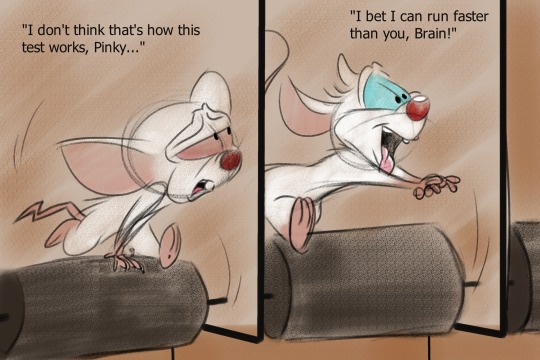
Experiment #2 - Rotarod Performance Test
Another experiment that’s generally harmless. One or multiple subjects are placed on elevated rotating rods so as to measure such things as endurance, balance, grip strength, and more.
I imagine Pinky would enjoy this test, as he’s familiar with running on a wheel and actually enjoys more strenuous activities. Brain, on the other hand, would only participate via sheer force. He’d also be more prone to fall after a shorter period of time, getting tired faster than his cage mate.
Video example: https://www.youtube.com/watch?v=v56MtrmWAs0
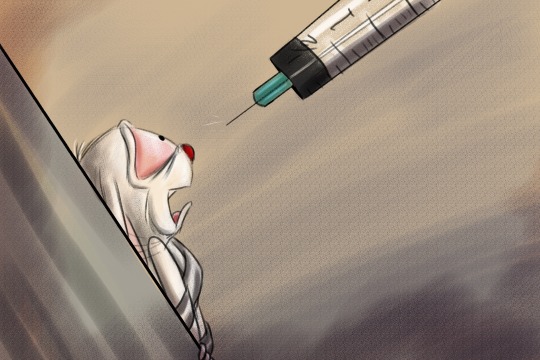
Experiment #3 - Shot (General)
Nothing special. Just Brain about to get shot.
This is all highly exaggerated, of course. A mouse would simply be held firmly, not strapped down, for a simple injection. Also, I can’t imagine why they’d be shot in the face, although Meg told me that scientists tend to draw blood samples from a mouse’s cheek. Need to look that up. I wasn’t at all going for accuracy here, but rather how it might feel -- how scary it would be.
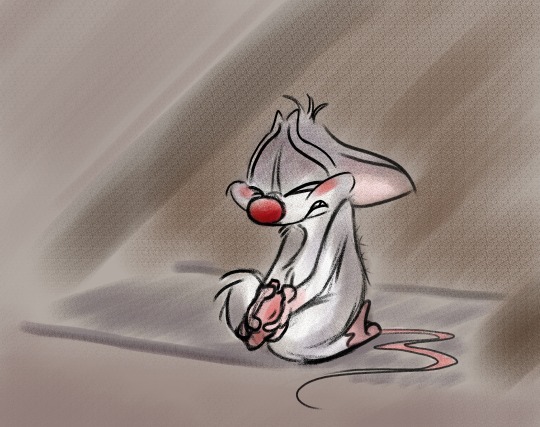
Experiment #4 - Sciatic Nerve Constriction
An experiment in chronic neuropathic pain, due to the central or peripheral nervous system sustaining damage. Under anesthesia, the animal’s sciatic nerve is exposed via skin incision. The connective tissue between the biceps femoris muscles and the gluteus superficialis is cut. The nerve is then loosely tied with four chrome gut ligatures so to occlude, but not arrest, blood flow. The wound is sutured, the animal is given 24 hours to recover, and then both hindpaws are tested for pain sensitivity. Sounds terrible, but it’s certainly not the worst of the experiments I researched.
I have no idea what’s going on with the coloring in this. Again, going for feel more than accuracy, but the hues are way too calm.
Information link: https://www.ncbi.nlm.nih.gov/pubmed/22433911
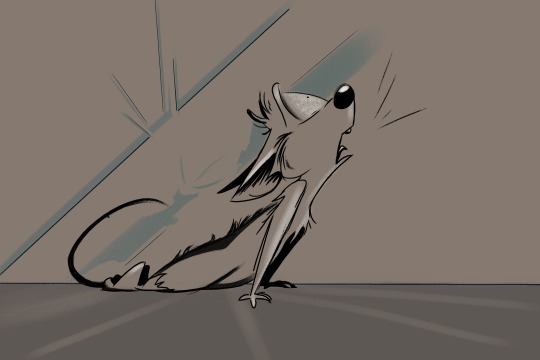
Experiment #5 - Writhing Test
Particularly cruel test in which acetic acid is introduced into the system, inducing severe internal pain. The typical response includes writhing, abdominal retraction, and stretching of the hind limbs. Despite the test being withdrawn in 2004 for unethical reasons, it is still employed by some.
This was my favorite one to draw. Although the lighting and shading are not the greatest, it made for an interesting experiment. I did not intend for the lines to be so bold, but it kind of turned into an almost comic-style illustration. I ended up playing around with it a bit and like the result enough to post it.
I would not watch the video below if you are squeamish. It is difficult to swallow. On another note, you may find the “Empathetic Behavior: Emotional Contagion in Mice” section in the second link of interest. For cage mates in particular, if one or both mice were injected with the same acid, and allowed to observe one another, an injected mouse would writhe more if its partner was also in pain. I can’t help but imagine Brain and Pinky in this type of situation....
Information link #1: https://www.ncbi.nlm.nih.gov/pmc/articles/PMC3543562/
Information link #2: https://www.sciencedirect.com/topics/biochemistry-genetics-and-molecular-biology/writhing-test
Video example: https://www.youtube.com/watch?v=Ib63O4F856w
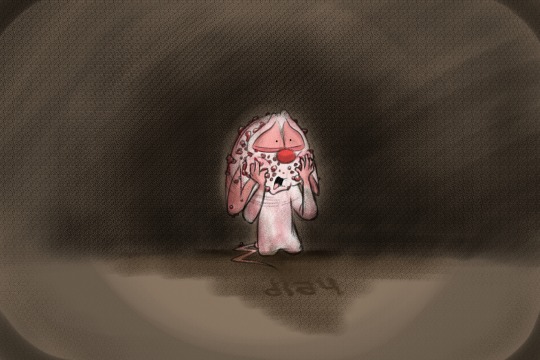
Experiment #6 - Transgenic K5ras Mouse / Nude Mouse (Combination)
Experiment in which cancer is induced in the system. Nude mice are bred for a number of tests, and are used for this one, as well.
My least favorite to draw, but my favorite to color. One particular experiment I found showed a tumor in every follicle on a mouse’s muzzle. Was trying to go for this look, albeit exacerbated.
Information link #1: https://www.cell.com/current-biology/fulltext/S0960-9822(98)70203-9?_returnURL=https%3A%2F%2Flinkinghub.elsevier.com%2Fretrieve%2Fpii%2FS0960982298702039%3Fshowall%3Dtrue
Information link #2: https://www.motherjones.com/politics/2012/08/weirdest-lab-mice/
-------
Bonus:
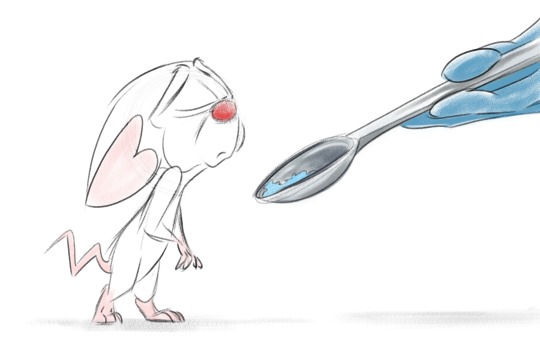
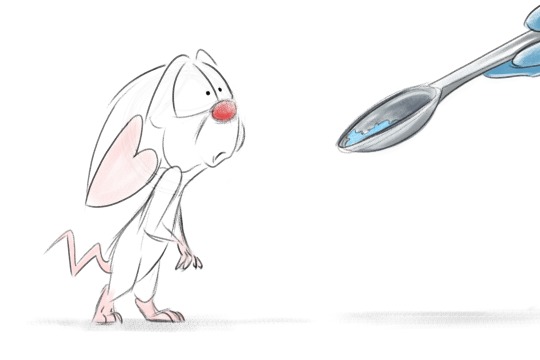
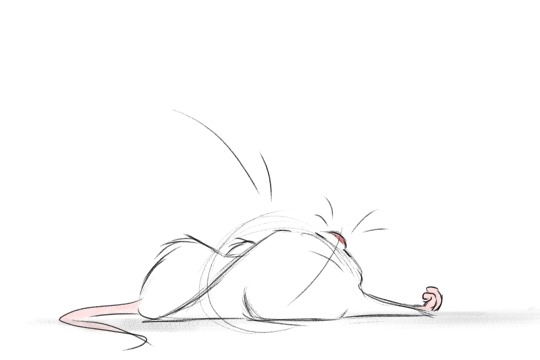
This is based on a test that I found absolutely hilarious. There’s a certain chemical, called W-18, that’s been on the drug market for... some years. The potency of it is supposedly insanely high, although this has never been proven. It’s basically a research chemical (created at a university in the 80s) with analgesic properties that were shown to be “painkillers or blockers of the painkilling effect of morphine in mice”. Mice, not humans. To quote a specific article:
“... when they first injected some of these chemicals into the animals at a dose similar to aspirin, the mice stood up for about a minute and fell over unconscious. They remained unconscious – for five days. But they weren’t dead. They were still breathing. And when they woke, they seemed fine, other than being really hungry and thirsty.”
They literally keeled over from the supposed potency of it. From what I recall, they don’t even know exactly what it was doing to their system, other than the fact that it knocked them out. I just find it funny that they were completely fine after awakening days later.
Although the pure smell of it wouldn’t cause such a reaction, I liked the idea of it in picture form and so depicted Brain simply taking a whiff before passing out.
Information link: https://www.forbes.com/sites/davidkroll/2016/04/30/w-18-the-high-potency-research-chemical-making-news-what-it-is-and-what-it-isnt/#2c45a5dd4757
-------------
Experiments researched, but not implemented:
- Tail dipped in ice cold water (mentioned here: cold water)
- Morris water maze
- Porton Down nerve agent test(s) (the worst; not even sure how I’d depict this)
The Porton Down tests sounded so indescribably cruel that I simply couldn’t bear to put Brain or Pinky through either of those, much less draw them out. It was the most horrific of the experiments I found, second only to a story about a French physiologist in the 1700s/1800s who performed, I believe, vivisection on live, six-week-old puppies. There’s a limit and that’s my limit. Even the cancer-based composition above was difficult to create. I legit felt dirty drawing it.
Researching these subjects was incredibly interesting, and I came across a few articles that touched on animal experimentation and the question of whether or not it’s ethical. Should such practices continue? It’s more complicated than a simple “yes” or no” answer. Some tests are fairly harmless, whilst others border on the inhumane, and some are downright cruel. Some people say that, without testing, there would be a lot less medicine on the shelves to assist in relieving and curing our ailments, whilst others argue that 90+% of the time the testing done is unnecessary, the results yielded by the subjects dissimilar to those that would be shown by humans and, henceforth, stating that the inaccuracies are numerous. This particular article offered up what I thought was a pretty genuine and interesting debate on the matter:
Pain in Lab Animals: How Much is Too Much?
In an interview with Dr. Jeffrey Mogil, a neuroscientist, he mentions that:
“You have complete control over everything in mice. Within limits, you can do whatever you want as long as you minimize pain and suffering of the subjects.“
Full interview: https://www.integrativepainscienceinstitute.com/latest_podcast/sex-differences-in-pain-and-pain-inhibition-with-dr-jeffrey-mogil/
While many establishments do follow the Animal Welfare Act, other laboratories still implement unethical practices. Also, the rules for what constitutes as acceptable in regards to tests that can only be performed without painkillers or anesthesia administered is... nebulous.
Thankfully, there is a number of lab testing equipment on the market specifically designed to be more humane and less stress-inducing to its subjects. These restrainers, for example, allow the animal to “walk in” without having to be physically forced backwards into a container:
Restrainers
Here is another example of testing that is relatively pain-free:
https://www.ncbi.nlm.nih.gov/pmc/articles/PMC4401362/
It’s simple and inexpensive while still allowing scientists to perform tests.
Below is a video showing how a type of rotarod works, one that doesn’t place the rods too high and provides a cushion underneath in case the subjects fall:
https://www.youtube.com/watch?v=T38fDS2i13k
This tail flick analgesia meter comes installed with a cut off timer to avoid damage to the animal:
https://www.youtube.com/watch?v=JgaStZt143o
So there are options. How often are such options utilized in the field? I have no idea, although there are laws that should be followed and, from the sound of it, generally are adhered to. Not everyone in this business is cruel. Though you do have your occasional psychopath who performs very morally questionable operations behind closed doors, I believe that this is a great exception to the rule, and that there are a lot of laboratory workers who genuinely want to inflict as little pain as possible upon the animal. Just an opinion. I don’t have tons of evidence, but it seems like most people are sane. Lol.
Most of the experiments I inflicted upon Brain because, I think, Pinky is so pure that I have a hard time imagining him sustaining any kind of extreme pain that would genuinely hurt him. Also, he borders on being freakin’ masochistic, finding pleasure in a lot of painful situations, whereas Brain does not. Brain has been through a lot, mentally and physically. It seemed more... “appropriate” to put him in these situations, as terrible as that sounds.
All of that having been said, I never want to do this kind of exercise again. While a lot of it was interesting, and some of it even fun, parts of it were legitimately painful. The cancer one.... I felt horrible....
47 notes
·
View notes
Text
the chances are getting lower
Pairing: Iwaoi
Rating: T
Warnings: Language
Words: 1700
Summary: "And although there’s the 80% - wait, maybe 70% - chance that Oikawa probably doesn’t like him back, Iwaizumi can’t stop himself from thinking how pretty he looks like this.
He briefly wonders if you could consider this a date.
He also thinks that the chance Oikawa doesn’t like him back might be closer to 60%."
AO3
the chances are getting lower
It’s summer when Iwaizumi has a life-shattering realization. Honestly, it really shouldn’t shock him that much. Maybe he’s just dense - that’s probably it.
He likes Oikawa.
He really likes Oikawa.
This realization doesn’t scare Iwaizumi as much as it had ought to, but he files it away as something to deal with later. Iwaizumi is about 80% sure his best friend doesn’t feel the same way, but when he’s being dragged through crowded festival grounds by said best friend isn’t the time to be debating the state of his world.
Oikawa has a tight grip on the sleeve of Iwaizumi’s hoodie and is in the process of tugging him along. He hasn’t said anything about their destination, but Iwaizumi knows better than to ask. So, without questioning, he follows his friend through crowds of people. They pass a row of games they’d played an hour or so ago (Iwaizumi had won a small alien plush for Oikawa and Oikawa won a cat plush for him), and then go through the line of food trucks, where the population density is highest.
Finally, they break out of the crowd. Oikawa turns around, his eyes shining as they reflect neon lights from all around them. “The fireworks are going to start in a few minutes, Iwa-chan!” And then he pulls Iwaizumi past further from the festival, to an open field. Several couples and friend groups had already settled in the grass.
They find a spot away from other people and sit in the grass. Iwaizumi stretches out his legs and leans his weight back on his palms. He briefly considers that, if his theory is correct, it’s like an invitation. It’s an invitation that Oikawa gladly takes. He rests his head on Iwaizumi’s thighs, laying perpendicular to him. Their eyes meet, and Oikawa’s eyes are bright as the expression on his face seems to ask is this okay?
It’s very okay.
And although there’s the 80% - wait, maybe 70% - chance that Oikawa probably doesn’t like him back, Iwaizumi can’t stop himself from thinking how pretty he looks like this. Pink and green lights from the festival behind them cast over his face, showing his light sprinkling of freckles on his cheeks. His hair, although beautiful, is subject to gravity, and thus has fallen away from his face and is spread across one of Iwaizumi’s thighs. God, he’s beautiful.
Not wanting to think about any consequences, Iwaizumi smiles and gently cards one of his hands through Oikawa’s hair. The other relaxes against him and closes his eyes, content.
They both startle when the first firework explodes in the sky.
Oikawa watches the show in amazement, but Iwaizumi watches Oikawa the whole time, just to see the joy on his face.
He briefly wonders if you could consider this a date.
He also thinks that the chance Oikawa doesn’t like him back might be closer to 60%.
Iwaizumi isn’t one to deny himself pleasures, as a general statement.
If he wants to eat, he’s going to eat. If he wants to watch a movie, he’s going to watch a movie. If he wants to look at a pretty boy, he’s going to look at a pretty boy.
The pretty boy looks back at him.
During practice, they’re playing a practice match, and somehow Iwaizumi ended up on a different team than Oikawa. Oikawa’s team is winning - but just by a little. They’ve been making eye contact the whole time, like you’d expect best friends to. But Iwaizumi rakes his eyes up and down his friend’s body, subtlety be damned, and he looks the same way he always looks when he’s playing volleyball - fucking incredible. Iwaizumi vaguely registers that Oikawa’s up to serve, but his head is far from the game as he watches Oikawa’s hands twirl the ball. Those hands. Iwaizumi’s knees feel weak when he realizes how long he’s been staring, but he’s too far gone now, it’s too late for him, he’s already passed the point of no return -
And then there’s a hard impact to his jaw, and he’s staggering backward, and suddenly he’s on the ground. There’s some dull pain - in his face, on the back of his head, on his ass - but he’s definitely felt worse.
“Iwa-chan!” Oikawa shouts as he ducks under the net and slides to a stop on his knees next to Iwaizumi. His eyes are filled with concern as he leans over Iwaizumi and cradles his jaw gently. “Are you okay? I’m so sorry, I -”
“Tooru, I’m fine,” he responds, voice hoarse. For a second he forgets their teammates are surrounding them, so he covers Oikawa’s hand with his own and smiles weakly. “I wasn’t paying attention.”
Damn, that serve hurt.
“Oikawa, take him to the nurse to make sure he doesn’t have a concussion,” the coach yells.
Cliche? Trivago.
Oikawa’s arm around his waist and supporting a good portion of his weight, they make their way to the nurse’s office. “Iwa-chan, what happened? You’ve never just taken a serve to the face like that before.”
Iwaizumi stiffens. “I was distracted.” It’s not a lie.
“Be careful, Iwa-chan,” Oikawa orders, but his voice is soft with genuine concern.
“If I get knocked out, no one else will keep you in line. I’m not going anywhere.”
He misses the look that Oikawa gives him, full of adoration.
The percentage might be closer to 50%.
Oikawa is laying on Iwaizumi’s bed, calculus homework spread around him, and Iwaizumi’s eyes are glazing over from where he’s been staring at an essay at his desk for the last hour.
Iwaizumi picks up the stapled stack of papers - twelve pages long, double sided!!! - and pitches them across the room and groans in frustration. “I’m tired of this bullshit!”
“Aww, is Iwa-chan tired of literature analysis?” Oikawa teases, resting his head on his arms.
“Yes,” he growls and goes to pick up the now-wrinkled papers. “I understand math, but this literature bullshit is driving me up the fucking wall.”
Oikawa pouts. “You want to do my calculus homework for me? If I see another integral, my brain may melt, and the team can’t stand to lose me.”
Iwaizumi regards one of Oikawa’s worksheets. “This really isn’t that bad. My class covered this last month. It’s just u-substitution to make your life easier. U-sub is your friend.”
“Look, you can say that all you want, but that doesn’t make the words make any more sense,” Oikawa complains. “This squiggle shit -”
“Integral.”
“- squiggle shit is bad enough, but now they’re throwing in inverse trig? My brain wasn’t built for math, Iwa-chan! It was built for volleyball!”
“I’ll do your calculus if you’ll do my literature.”
“Fucking deal.”
After trading homework, they finished their respective assignments in about twenty minutes, after which, they both laid down on Iwaizumi’s bed, Oikawa’s head on Iwaizumi’s stomach.
“Thanks, Iwa-chan.”
“Thanks, Tooru.” He lightly runs his fingers through Oikawa’s soft hair as the other relaxes and purrs quietly under the touch. “Are you spending the night tonight?” It’s a Thursday night, but that’s never mattered to them.
“Sure, but I’m not moving,” Oikawa announces and grips onto Iwaizumi’s hand that’s laying by his side.
“...Alright.” Iwaizumi pauses his ministrations. “Do you want to watch a show before bed, though?”
“Ooh, can we watch that American cooking show?”
“Yeah, we can,” he laughs.
After a few minutes of shifting, they end up shoulder to shoulder with Iwaizumi’s laptop balancing on both of their legs. Oikawa drops his head onto Iwaizumi’s shoulder and grips his bicep. Then, he carefully entwines their fingers and squeezes gently.
Iwaizumi, heart pounding, looks down at his friend in surprise. He doesn’t know what to do from here, so he just goes along with it and sinks into Oikawa as he watches the terrible American show that Oikawa has taken a liking to.
He’s thinking that the percentage might not be 50%, but maybe closer to 30% when Oikawa pulls their conjoined hands up to his own mouth and kisses them.
Iwaizumi’s fairly certain that, in that moment, his heart stopped. “Tooru?” he whispers, not wanting to break the magical moment, but too scared to let it go unrecognized.
“Iwa-chan?”
20%.
“What are you doing?” The contestant on screen is crying over ruining his potatoes.
“Do you not know?”
10%.
“Know what?”
Oikawa lifts his head and focuses all of his attention on Iwaizumi. “I like you a lot. I think you probably feel the same, don’t you, Hajime?” Inhale. Exhale. “I really hope you do, anyways, or else this is going to get weird,” he laughs nervously.”
Iwaizumi smiles softly. “Of course I like you too. How could I not?”
“That’s exactly what I was figuring,” Oikawa says cheekily. “Can I kiss you?”
In lieu of a proper response, Iwaizumi brushes their lips together, gently at first and then more firmly. Oikawa responds immediately, kissing back with fervor and dragging a hand into Iwaizumi’s hair.
Iwaizumi pulls back suddenly. “I’ve been waiting to do that for a while.”
Oikawa reclaims his lips in a searing open-mouthed kiss that has his entire body writhing and wanting more, more, more. Iwaizumi moans quietly into his mouth and nips gently at Oikawa’s lower lip, drawing a beautiful, breathy moan out of the other.
The laptop on Iwaizumi’s lap is long forgotten as Oikawa climbs into his lap and presses their bodies closer together. Everything is so hot as they pant into each others’ mouths. Oikawa works his way down Iwaizumi’s neck, kissing firmly but careful not to leave any marks. Iwaizumi inhales sharply and presses his hips upward, seeking some friction.
“Fuck,” he swears as their hips collide. The indirect contact alone feels so, so good. He tugs on Oikawa’s hair mostly out of desperation, bringing him back up to his mouth. He connects them in another hot kiss as Oikawa grinds down.
And then, suddenly Oikawa disconnects their lips. “We should slow down just a bit, alright? I… I don’t want to be too hasty with you. You’re too important.”
“Of course,” Iwaizumi responds and kisses him chastely. “Anything for you.”
Oikawa grins and snuggles into Iwaizumi’s chest. “I like you a lot, Iwa-chan.”
“I’m pretty damn fond of you, too, Tooru.” He kisses his hair.
“Good. Don’t let me go.”
“Not a chance.”
0%.
#iwaoi#my writing#iwaizumi hajime#oikawa tooru#hq#hq fanfic#iwaoi fanfic#fluff#canon compliant#mutual pining#friends to lovers
19 notes
·
View notes
Text
10 Tips from a Theatre Production Major
1. Don’t make your whole life about theatre
It is so easy to get sucked up into the realm of theatre between your lectures, show calls, your Spotify playlists, going to check out all the plays happening in the city, etc. But there is so much more out there! It can definitely feel draining but don’t be afraid to listen to different music genres or take classes in other subject areas.
2. Take elective courses you’re actually interested in.
Okay so you can go into Google and type in “(your school’s) easy elective courses” but that is wrong on so many levels:
The workload may be easy but if the subject is so mind-numbingly boring you’re not going to do well.
You’re spending all this money on post-secondary education, why not use it to study something you have an interest in?
I personally took U.S. American history because I love history and partially because of Alexander Hamilton but I’m also taking French and Mandarin courses because I enjoy it and it’ll be useful for me in the future.
3. Make friends outside of your program
If you’re in a small theatre program (I have around 50 people in my year) and you’re all taking the same required courses you can definitely get sucked into only socializing with the same people you’re stuck with. However, it is so refreshing to be able to talk with someone not in your program and not about theatre. I meet up with a few of my non-program friends once a week/every two weeks in order to get a break from my program. Strike up a conversation with people in your elective classes or join clubs to meet people who won’t always be talking about the next show or upcoming assignment.
4. Take care of yourself
SO. SO. IMPORTANT. My program recognizes the terrible work/life balance the entertainment industry has so every Sunday our theatres go dark in order to implement some sort of balance for us. In a similar vein, you have to look out for yourself. Especially during tech and show weeks, make sure you get enough sleep every night. If you’re a commuter like me, see if you can crash at a friend’s. Bring lots of snacks so you’re not starving when you need to be alert and learning. Also try your best to work on assignments beforehand so you can relax a bit while you’re stressed out of your mind. And for your elective classes, let your professors know what’s going on and see if you can get extensions on assignments. Usually they’re pretty sympathetic but just don’t know how time-consuming our program can be.
5. Recognize your strengths and weaknesses
When I was in high school, and there were 5 tech team members, I thought I had to be good at stage management, lighting, audio, and everything else in order to make a show run. THAT IS NOT THE CASE! When I got to university I realized there were so many different aspects that there is no literal way that someone could be good in every single thing. I definitely struggled with not excelling at everything, I realized I’m pretty bad at costume and I have a lot to learn in carpentry but I’m okay with that! And I have plenty of people I can ask for help, and I can help them with lighting and audio.
6. Everyone learns at a different speed
Everyone has different experiences in theatre production coming from into university. Some are coming straight from high school and have been heavily involved in theatre for 5+ years (mE), some are more interested in film/TV but are here anyways, some have admired it from afar but have little to no experience. My point is, everyone’s path is different and your first year is an introduction year to get everyone to the same level. If you’re more experienced, don’t be annoyed that you’re back to learning the basics because you came here to learn and that is what you’ll be doing. I promise you’ll be given more responsibility and opportunities to show off how much you know but for now, be patient and let others catch up and learn.
7. Yes theatre history can be boring
I don’t know about you folks, but I love political/social history so I thought theatre history would be lots of fun! Unfortunately, not so much. My history courses were taught together with the acting and dance programs so it explored a lot of acting and dance history with a little production history sprinkled here and there. There is only so much you can pretend to care about how revolutionary some French writer from the 1700′s was and how he cHaNgeD tHe gAmE. Anyways, we’ve all been there, I promise it will end in eventually and after that you probably won’t ever have to think about it again.
8. Don’t get involved in drama
Again, if your program is small, that means word gets around. (This is also true in the industry; theatre is very small and if you have a bad rep it’s definitely hard to get rid of it) This means that if there is drama (and there definitely will be who are we kidding) try your best not to stick your head into it and stir the pot. If you really have to, vent to someone outside of your program so no one can trace it back to you.
9. DO. NOT. DATE. IN. YOUR. PROGRAM.
I don’t care how cute you think that person is the first week of classes, do not go for it I promise it will not end pretty and you’ll feel super awkward until you graduate and then end up working with them. There are 50 000 other people at your school/in your city/in your life that you could date so go find one of them.
10. Have fun!
Okay I understand how cheesy this sounds but stick with me for a second. You’re here because you really really like theatre and live entertainment and it’s fun! So why shouldn’t your education experience be? For the first time in a long time, I truly looked forward to going to school and that’s how enjoyable it should be for you. And if you realize theatre isn’t for you? That’s totally fine and you should be chasing what makes you happy instead of sticking it out just because you chose it when you were 17. If that means taking a year or two to discover yourself and find out what you want in life, do it because you’ll be living a long one.
#theatre production#theatre major#theatre#studyblr#techblr#university#college#major#10 tips#schooling#advice#college advice
105 notes
·
View notes
Text
Remember me saying I was writing Julian and Remy meeting yet again? The boys are here in 1700 words of Soft (sorry there’s no cut, mobile is garbage)
—
Julian wasn’t much one for parties, least of all ones his mum hosted. He loved dressing up, sure, especially at a masquerade where he could be especially extravagant, but he found that being surrounded by strangers quickly overwhelmed the fun of a pretty outfit.
It really was a pretty outfit. His mask was an intricate weave of red and pale gold, with a rose made delicately from thin sheets of metal over his left brow. He’d matched the rest of the outfit to the mask: a vest in a rich red brocade with patterns of roses and thorns, a smart jacket with gold accents around the cuffs, and a pin in his cravat shaped into a rose by the same craftsman who’d made his mask. Just before the night had begun, he’d clipped a rose from the garden, snipped off the thorns, and arranged it in his hair over his right ear to balance the mask.
Too bad the jacket was draped over the back of the chair, the midsummer air and stuffiness of the ballroom making it unbearable, and the only ones here to appreciate the ensemble were him and the glass of champagne he’d been sipping at for half an hour. At least the drink went with the outfit.
He leaned on the round standing table, watching the bustle of the dance. His sister, Kitty, twirled a girl in blue who he’d probably recognize if he could be bothered. Mum was alone near the band, she and the musicians the only unmasked people in the room. The servants, otherwise in uniform, wore simple masks bought with extra pay.
He thought he was alone in his corner, so a polite “hello” from his left made him jump. He set down his champagne, thankful he hadn’t spilled it, and returned the greeting. At his side, a respectful few feet from the table, was a man he was quite certain he’d never met. His mask sparkled in blues and greens and silver, with peacock feathers on one side reaching well over the top of his head. His eyes glittered behind the mask, and he wore an easy smile Julian was almost jealous of.
“Hello,” Julian said again, self-consciously tugging at the bottom of his vest.
The stranger bowed slightly, holding out one hand with the other tucked behind his back. “May I have this dance?”
Julian was silent for a moment, his mind blank of any coherence. “Um,” he said eventually, “I never learned how…”
“How do dance?” The man straightened out of his bow with a flustered look.
“Not, um,” Julian picked up his champagne, fiddling with the stem for some comfort. “Not with another man.” Kitty had been the one bold enough to learn both parts. Julian had never asked.
“Would you like to learn?”
Julian considered for a moment, downed what was left of his champagne, and held out a hand to take the peacock’s. He grinned and gently tugged Julian to him.
Julian took a moment to think, reversing the steps he knew before the dance begun. The peacock was more confident, laying his free hand on Julian’s waist and leading him into the steps of the dance. Julian tripped over his feet almost immediately, muscle memory taking over and moving his feet the wrong way. He laughed nervously and corrected himself, trying to follow the peacock’s movements more than think about his own.
For several minutes, the two were silent, Julian too focused on where his feet were to think of much else. Eventually, though, he fell into the rhythm enough to look up to his partner’s face. “I don’t think I know you,” he ventured.
“I don’t think you do.” The peacock smiled. “What’s a masquerade for if not to dance with a stranger?”
Julian flashed a smile of agreement and fell quiet, not sure what else to say.
“What brings you here?” the peacock asked after a moment. “You don’t seem to be enjoying yourself much.”
“My mum’s the host,” Julian said. Maybe that would give away too much, but the family resemblance was clear enough, anyway.
The peacock chewed his lip, looking up in thought. “Starts with a C?”
“What does?”
“Your name.”
Julian smiled. “If you don’t remember, it doesn’t matter.” It was a relief, in fact, to not be associated with his family for a moment. A name meant more than a face, anyway. “It’s a masquerade. Dance with a stranger.”
The peacock grinned, and they danced wordlessly for a few moments.
“What about you, then?” Julian asked. “Why are you here?”
The peacock shrugged. “It’s a party.”
The song ended and Julian stepped back from the peacock to stretch his arms. “You like this kind of thin, then?”
“Most of the time. It’s a good chance to meet people.”
“At a masquerade?”
The peacock laughed. “The dancing’s fun, too.”
At that, the band started up again, bursting into a fast-paced, jaunty number. Julian had always dreaded those kinds of songs in dance lessons, not least because Kitty always flung him out a bit too hard, but at the way the peacock’s face lit up, he found himself smiling, too.
It was a disaster of tripping over his own feet and stepping on the peacock’s, the music flying by too fast for Julian to think through the steps. The peacock didn’t seem to mind. He murmured assurance at Julian’s apologies until he stopped apologizing altogether and let the clumsy jumble of limbs be some fun, a smile fixed on his face that he couldn’t shake if he’d tried.
As the song crescendoed, the peacock spun Julian under his arm and leaned back, holding tight to his hand so they caught each other’s momentum. Julian laughed out loud and the peacock pulled him back in, twirling him until his back was pressed to the peacock’s chest, his arms crossed in front of him. The song came to a decisive end, but Julian let the peacock hold him, still exhilarated and giggling. The feeling of the peacock’s breath in his hair made him shiver.
“Caldwell!” the peacock said, triumphant.
Julian tensed, and the peacock let him go. “What?”
“Caldwell?” the peacock repeated, though his tone had turned concerned. “That’s your name, isn’t it?”
The bubbling joy of a moment before drained out Julian’s feet, replaced by the stinging feeling of ice in the backs of his hands. “Yes,” he admitted shortly. The ballroom was too loud, and the stuffy air pressed hard around him. He couldn’t breathe right.
“Oh.” The peacock frowned and reached a hand towards him, not touching. “I’m sorry.”
“It’s fine,” Julian lied, drawing his arms close to himself. “I’m going to take a minute outside.”
“Are you all right?”
“It’s hot in here.”
Julian stalked for the door.
Outside, Julian sat near the bottom of the stairs. It was cool and dark and quiet here. He took off his mask, the cloth starting to make his face itch, and breathed deep through his nose.
It wasn’t fair to be angry. Julian hadn’t even realized himself how much he’d enjoyed his relative anonymity, he couldn’t expect the peacock to. Still, it stung to be snapped back into reality, one where he was Julian Caldwell and not a pretty stranger at the ball. Where everything he was good at didn’t matter, and everything he was bad at did.
Shoes tapped down the stairs behind him, and he took a moment to regain his composure before he turned around.
“Hello,” the peacock said, standing several feet back. Julian couldn’t make out his expression in the darkness. “Your sister said I should go after you, but if you’d like me to leave, just say so.”
Julian shook his head, turning back to face the bottom of the steps. “It’s all right. Kitty was watching us?”
“She said she’d never seen you have fun before.” The peacock’s tone was more certain now, and he descended to sit by Julian, still keeping a respectful distance. He’d taken his mask off, too, and dangled it off one finger. “I couldn’t tell if she was teasing.”
Julian laughed softly. “That’s Kitty for you.”
A silence passed, somewhere between comfortable and horrendously awkward, before the peacock spoke again. “I really am sorry. You said it didn’t matter. I should have let it go.”
“I’m not upset with you.” Julian sighed. “I’m just...frustrated. I’d have liked not to be Caldwell longer.”
The peacock glanced at the flower in Julian’s hair and said, “A rose by any other name would smell as sweet, right?”
Julian shrugged. “Names mean a lot, I think. Juliet had to convince Romeo he’d still be somebody without his name. I guess I wanted to be who I am without mine.”
“You understand that play better than me,” the peacock admitted with a short laugh. “I just thought it would be romantic.”
“It was,” Julian said, letting himself smile now. He scooted a little closer to the peacock.
He grinned back. “Would you like me to tell you my name?”
“There’s no need to,” Julian told him.
“What if I said I wanted to?” he amended. “If names mean something, I’d like you to have mine.”
Julian’s face warmed. “All right?”
The peacock turned on the steps and held out a hand to Julian. “Remy Hackett. It’s a pleasure to meet you, Rose.”
Julian beamed, the nickname making him almost giddy. He took the peacock’s hand in a firm shake. “The pleasure’s all mine, Mr. Hackett.”
“Call me Remy.”
Julian moved still closer. He looked into Remy’s face, searching for permission. Remy closed the gap between them and gently scooped Julian against his side.
“Is this all right?” he asked softly.
“More than,” Julian murmured. Remy was warm, though it was comforting now rather than stifling. “Thank you.”
“For what?”
“For understanding.”
Julian let his eyes slip closed as Remy laced his fingers in his hair. It had been a long time since anyone held him like this. He hadn’t realized how much he missed it.
“I’d like to see you again,” he murmured without thinking. Then he blushed and extricated himself from Remy’s side.
Remy was grinning. “I didn’t want to ask before you did,” he said, relief clear in his voice. “I’ll write to you tomorrow.”
Julian smiled back, resolving not to breathe a word of this to Kitty. “I’d like that.”
Remy stood from the stairs and bowed slightly, his eyes gleaming in the dark. “Rose, may I have this dance?”
Julian took his hand and stood with a bow of his own. “You may,” he said, and the two returned to the ballroom hand-in-hand.
#my writing#ASR#Julian#Remy#I Will right more ASR over the summer and these two Will be extremely tender#meanwhile Kitty and Genevieve will be their slightly feral rowdy girl selves and that will ALSO be a very good time
3 notes
·
View notes
Text
Banished
(1,400 words, ~ 6 mins)
Banished, Colonial Charter, The North, and the 4 gigabyte Megamod
I purchased the game Banished (2014) some time ago, but hadn't gotten around to actually playing it until recently. (I also replayed the excellent Populous: The Beginning, a game released back in 1998, and thus presumably older than some of the people that read this blog. Both are or were going for around $5-7 lately.)
Reviews described death waves, crop infestations, entire towns lost due to starvation, families killed by frostbite, and fires wiping out house, smithy, and storage barn alike. And sure, I could micro-manage a hundred tiny medieval villagers in a never-ending fight against the crushing poverty of the era, slowly grinding away surplus on meagre human and animal power, always one harsh winter away from ruin in an unforgiving wild landscape... or, having bought it on sale, I could wait and test it out when the mood struck me.
After playing vanilla Banished, I wasn't sure who wrote those reviews.
(The old way would have been to attribute this to console gamers, but this is a forward-thinking blog and we embrace inter-system solidarity.)
Build the hut to gather some berries, then plunk down some houses and a woodcutter before the winter hits and you, too, will soon be waiting impatiently for the randomly-determined traders to bring the specific variety of seed or animal you were hoping for and finally give your villagers the nutritionally-balanced breakfast they deserve. Yields will vary with the climate and seasons (and you'll lose some yields when winter comes early), but stored food in Banished doesn't rot and only about a quarter of your villagers will need to be assigned to food production.
If you're used to these kinds of games - say you racked up some hours in Anno 2070 - vanilla Banished will seem light on content. The production chains are short, the variety of goods is low, and there are only two kinds of houses. If it seems as it were made with a development budget of "just one guy," well it more or less was.
Once getting a grasp on vanilla, it was time to get some mods. More specifically, mod compilation packs, something I've learned to appreciate from industrial minecraft.
Colonial Charter
Colonial Charter is a mod pack with a relatively unified aesthetic and theme (although less unified on either count than The North, which we'll discuss later). You're (implicitly) a colonial governor working on behalf of some European power perhaps in the 1600s or 1700s. If you were hoping to engage in the true violence of the colonial era, setting out to conquer a continent with only muskets of iron and a will of steel, you will be disappointed - Banished does not feature combat. With one fierce touch, hunters transmute a deer into venison and leather without even the pretense of a bow and arrow, and so Colonial Charter represents your colony's entirely-optional military adventures as just another production building, this time masquerading as a rocky outcrop. (It does dutifully note your soldiers will require snazzy uniforms, the 'full livery' itself the result of a production chain.) If you want to build the rest of the fort, though, with cannons and wooden palisades and the like, you're in luck. Vanilla Banished has certain rustic charm to the art, and that's still on display here, so you may well find yourself taking a picture of your snow-covered frontier fortress with canons that don't do anything.
Both vanilla Banished and Colonial Charter lack a capstone building, like Anno 2070's 'monuments,' as well as, it seems, specific victory conditions. Disasters, when activated, seem relatively rare. In one game two wooden houses burned down, hardly a major setback for the Mitigated East Pensachussets Company. In another, a tornado tore through an uninhabited part of the map, and in another, a disease outbreak resulted in the (ordered) slaughter of about 75% of my supply of beef cows - a herd which was itself only one third of my supply of farm animals. In fact, with traders taking food in trade, I was often swimming in supplies, the only real constraints being the slow rate of production for Building Supplies or Fancy Homewares and waiting for traders to bring the right kinds of seeds (either for specific industrial purposes, for diet balance, or for a diversity of crops to resist blight).
But buildings don't require maintenance, so even a relatively slow production of Building Supplies is just a cap on the rate of expansion (while in real life, if you don't continuously produce the same, your building stock will gradually decrease in number and condition). Banished could use some elements from Anno 2070 - the combat or the missions help to liven things up and create breaks in the periods of building and stringing up production chains, and present a bit of risk/reward in how you allocate your resources. Alternatively, a genius aspect of The Sims 3 was the "wishes" system, both the "lifetime wish" and the more ephemeral ones that came up in response to immedate context, which could be "promised," creating a stream of game-seeded player-directed mini-goals that implicitly create a narrative around the relatively empty vessels of the sims themselves.
Story aspects presented in either way might be interesting - and a good resource sink.
The North
The North is a mod best acquired from its website. The Steam Workshop edition is out of date.
The North is more-or-less everything I thought Banished would be, but Norse, and still without unpreserved food rotting. Starting with only a chapel, one man's worth of rye, and around 20 nomads, none of whom were in the posession of tools, I subsequently struggled to reap enough surplus production to afford a charcoal pile in the hopes of maybe one day using it to fuel a blacksmith, as often even if the grain were planted early, winter would arrive early, and despite throwing every villager in the village at the fields, not enough grain could be collected to survive the year before it succumbed to bitter cold. In one village an entire population froze to death. In another, they starved. It was, in a word, brutal.
But the difficulty of The North depends a lot on the starting conditions. In the Shepard start with three families for a total of nine villagers (six adults), each with tools and the village starting with a herd of sheep, the situation was much easier. The North requires a lot of micro-management. It extends the idea of the game's developer of a more personal style of city-builder, where each villager and each family matters. In this case fewer villagers was better - while rotating one or two through the production chain to replace the tools, there were fewer mouths to feed, and thus less overhead needed for manual hunting and gathering.
The buildings are nicely-made, but while in vanilla and Colonial Charter child villagers reach age 18 after about 4 game years, in The North it appears villagers age one year per game year. This makes the situation easier to handle (as The North is tough!), but growth takes longer. Ultimately I didn't want to micro-manage the village for 100 years to get it up to size, though it might be worthwhile to visit it every now and again for the gentle gardening feel of the shepard's hamlet.
Megamod
The problem with the 4.67-gigabyte (once uncompressed; it's 1.5 GB compressed) Megamod is that it has too many mods. This makes it in some ways reminiscent of Minecraft modpacks like Feed the Beast (long live Industrialcraft). If you want to build the perfect-looking little village, Megamod is probably the best - especially if you want to stretch across the whole map, rigging up canals, moats, ponds and castles. But it's unfocused, with too many concepts and too many buildings. Some of the buildings are great, while others are clearly novice efforts. With so many options for everything, it would likely be easy to min-max and lose the element that makes Banished a game. Had all the effort that went into these mods been, instead, applied as one project with a relatively coherent vision of gameplay, it would have been able to produce a game that is 'complete' in a way that vanilla Banished is not.
Alas, with normal Banished food yields in Megamod, I set my villagers off to gathering up food and farming and wandered off to look through the piles and piles of buildings. I'd say that maybe somewhere in Megamod is a tornado shelter, but I doubt the base game code supports it. In the Early Summer season, a tornado ripped through what very little existed of the whole town, destroying every building and carrying off all the villagers to the great beyond.
4 notes
·
View notes
Text
Resist (Michael Langdon xReader)
Summary: Michael Langdon had been able to have anyone and anything he wanted, until he came across you. Your resistance would have him wondering of ways he could break you. Would he move on, or would it drive him mad?
Warnings: Possibly angst?
Word Count: 1700
A/N: This will probably be a few chapter, i didn’t want to rush into anything just yet, but i feel like this is gonna be fun! this is inspired by an anon from @thelangdoncooperative, check their page out!
Part 2 | 3 | 4 | 5 | 6 The Finale
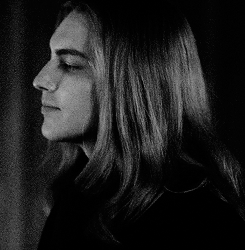
You’d been so secluded for the past 18 months. Barely speaking to anyone, just being where you had to be. You were always a bit reserved, only speaking out when you felt it needed. In these few months, you didn’t bother. Between the hairdresser Gallant and his snobby client Coco, you knew you were not here to make friends, simply survive. If you had to pick someone that you enjoyed, it’d only be mallory. It was always a bit awkward having her “serve” you. You were what they called a purple, and she a grey. Social class can’t even be demolished after the end of the world.
The outposts leader was a lady named Ms. Venable, and her weirdo accomplice Ms. Mead. You were less than thrilled every single time they thought to speak with you, who cares about rules. Who cares about anything when the world is dead, and you were mustered into this thing by men who said you were fit for the new world. What does that even mean? your running thoughts were quickly interrupted by Ms. Venable introducing someone. You’d been in the main living area lost within your own mind. You looked up to see a glimpse of a man with long blonde hair, his blue yes on you as he entered the room walking straight to the front.
“My name is Langdon and I represent the cooperative.” your eyes scan him, examining his outfit, “his outfit is almost as ridiculous as ours, he has to be in on this.” You felt yourself smirk at your thought. You felt someones eyes burning a hole into you, looking up from your folded hands your eyes met with his. Langdons head titled a bit, staring at you. Almost as if he heard you. You shot him a half smile and his focus shifted back to the entire room.
“I won’t sugar coat the situation. Humanity is on the brink of failure. My arrival here was crucial to the survival of civilized life on earth. The other outposts have been overrun and destroyed. We are assuming they’ve all been eliminated.” Langdons words make the hair on your skin rise. Did you really survive the apocalypse just to die anyway.
“What happened to the people inside?” your voice a bit shaky, everyones eyes were on you stunned at the sudden appearance of your voice. His head turned to you, his eyes glowed, you took a deep breath not knowing how he would reply. To your confusion, a smirk grew wide across his face.
“Massacred.” his voice sung the word, still holding eye contact with you. Your heart sunk, the anxiety inducing response only made your hands sweaty and your heart race.
“The same fate that will befall on almost all of you.” he continued his monologue, being interrupted again by a small voice at the back of the room.
“Almost all?” mallory seemed intrigued by his use of the word.
“Knowing this could happen, we built a fail safe. The sanctuary. It has security measures that prevent it from overrun. The sanctuary will survive, so people populating it will survive, therefor that means humanity will survive.” the room fell silent for a second, Gallant quickly chiming in.
“Who’s populating it?” his question was one you’d been thinking too, just didn’t want to intervene yet again.
“That’s classified.” his tone sharp and cold.
“However, i’ve been sent here to determine if any of you are worthy and fit to join us. The cooperative has developed a particular questioning technique we like to call...co-operating. I will use the information gain to determine if you belong.” his act was clearly trying to be intimidating. He looked like a regular ole’ white man, what made him so special?
Langdon had went on about this questioning for a little longer. mentioning if you did not want to partake you would end up dying. Your eyes rolled a bit, over the dramatics he was pulling.
“Y/N.” the sudden sound of your name surprised you, again looking up at a particular tall man by the name of Langdon.
“Since you seem so excited, our interview will began...now. Follow me.” the room seemed scared for you, their eyebrows raised and mouths agape. Since he came into the room it was as if he’d been trying to pick on you. You were less than happy about this way of determining who gets to live, but you’d rather some weird question than radiation.
//
You had arrived to his office, following him like a lost puppy throughout the halls. You entered the sliding door, looking around and taking it in. The room dimly lit, his desk was a few feet from a fire place with two leather sits in front of it. He was living better than everyone else and to your knowledge he had just arrived.
“Please, have a seat.” his hand gesturing to the chair across from him. You shrugged your shoulders taking his hint, and plopping down for a seat. It had almost felt like you were having a staring contest. Neither of you were speaking, just looking at each other.
Langdon was looking at her as if he was rummaging through her idle mind. He knew from the moment he stepped into the outpost he’d be drawn to her. The smell of her was so--pure. He was disgusted walking in, she was too good. He had to break her down somehow, show her how much evil she can really do, how disgusting she can really be, if someone were to push her a bit.
“So...how does this work?” you decided to break the awkward silence. His face of disgust really not sitting well with you.
“I’m not going to tell you what criteria i’m using to grade you. Things you may feel are helpful may be hurtful, things you may think compel rejection may be just what i am looking for. If you lie, i will know, if you try to trick me i will know and this interview will be over and you will die here. Are we clear, Y/N?” his voice echoing through the room just as ominous as its original source.
You nodded shyly, waiting for his next move. You were a bit frightened, but didn’t want to show him that. He was just a man with some power. Nothing to be afraid of, so you thought. Your eyes and his met again, his blue gaze was intense. He radiated an energy that made you want to cower in front of him.
“What is your opinion of me?” his mouth turning up in a smile.
You titled your head a bit confused “Why? am i supposed to kiss up and then get my ticket to the sanctuary?” you giggled at yourself, apparently he didn’t find you as funny.
“I don’t have time for your jokes, answer my question.”
You raised an eyebrow at his serious tone, clearing your throat out of nervousness.
“I think...um, you’re intimidating?” hoping that was an okay answer, you folded your hands in your lap.
“What about me is intimidating.” his question more of a statement. You’ve quickly learned he doesn’t care for any bullshit.
He was trying to bait you. He could read how nervous he made you, knowing well that was going to be your answer. He wanted to manipulate your feelings, get you to admit something more. You watched him get up from his seat, making slow strides to you. Looking up at his figure, you gulped loud and continued your response.
“I don’t know- something about your aura i guess. You’re just...i don’t know.” you shook your head now looking down at your hands once again. You felt the chair move, he had pulled your chair out just a bit to kneel before you--feeling the warmth of his hand on your thigh.
“Tell me. Tell me how i make you feel.” his eyes seemed so much darker, looking into yours. Your heart raced with fear, something about him seemed so malevolent. You were a bit turned on. Not knowing if it was the 18 months alone or the fact that your virginity had you thirsting after anyone who touched you.
You had yet to answer him, growing more uncomfortable as the time went on. His hand caressing your thigh, and the other moving to your face. His fingertips traced your cheekbone down to your jaw. You body gets so hot, you feel your breathing heavy, it’s like he was seducing you with his touch. Your eyes fluttering as he smiled at you. Satisfied with how you’ve been reacting to his touch.
“Y/N, i’m growing impatient with your silence. I know how bad you’re burning for me. My touch making you weak, tell me.” you shook your head at his statement. Pushing his hand away from your face, you adjusted yourself in your seat.
“No, that’s absurd. You’re crazy. I need to leave.” you nervously ran from your seat, wishing the door was closer there until--a strong force grips your wrist pulling you back. You almost lost your balance, turning around to see Langdon snarling at you. His grip twisted on your arm, looking much darker than you ever imagined.
“TELL ME. YOU CAN’T LIE TO ME.” his voice raised making you wince, pulling your wrist back with all your might you just couldn’t get out of his grip. In your adrenaline induced state you decided to use all your body weight to push him to the ground--”I’M NOT LYING, LET GO OF ME!”--his hand finally releasing from your body as he stumbled on the floor.
You ran far from that room, not looking back. Leaving him there to bask in the defeat. He was for once confused at a human response. He tried so hard to break your walls. He knew somewhere in you could be manipulated into being sinful for him, usually people don’t fight the lust he places within them. The pathetic and weak humans of the old world give into their carnal desires within seconds of it being presented. You were different, he knew he had work to do with you.
#michael langdon#cody fern#american horror story#ahs coven#ahs murder house#ahs8#michael langdon smut#michael langdon x reader
628 notes
·
View notes
Photo

Before I even begin this one, I’m going to say - don’t stress. Casting your first spell can be one of the most intimidating things when you’re first starting out on your path. The issue, I think, is that when we see spells or rituals in pop culture it can seem to be this massive thing. Perfect rhyming words, uncommon herbs with fancy names, 1700 candles that have been anointed by a High Priestess with sigils carved into them. However, like the rest of your path, performing your first spell doesn’t have to be spot on the first time, and believe me, it won’t.
You will forget things. I did, and that’s okay.
You might find it odd. Again, totally fine!
You might even decide half way through that you’re not happy with the way you thought you were going to perform the spell, or the way the books said to do it isn’t really your jam.
All of the above is 100% okay.
To perform your spells, you don’t need the biggest crystal ball, strangest sounding essential oils or an assortment of expensive tools. Use what you have at your disposal and what you feel comfortable working with.
By the end of this post, I aim to get you feeling more confident in taking those first steps or giving it another go.
Let’s start with the prep work. And yes, most spells will take some prep work. Of course, you can go for it on a whim when the fancy takes you, however, if you’re feeling like this is something you want to do, check in with your emotions first. What is it that is making you want to do the spell? Successful spells require a clear mind and calm. If you are angry, sad, overly excited, etc, it can throw the spell off balance.
You’re going to need a pen and paper. Come up with a clear and concise statement in your mind that sums up EXACTLY what you want your spell to achieve. It is so important to make sure that your wording explains the purposes clearly.
Think of a spell like a genie - if you don’t make the wish exactly as you want the results, the genie can find loopholes and you may not get the desired result.
REMEMBER - MAGICK TAKES THE PATH OF LEAST RESISTANCE. By this, I mean that Magick will find and follow the easiest route it can to bring what you have called out for into your life.
For example, if you want to do a spell to bring in more money and it’s very vague, it leaves a lot of leeway. You could do the spell, and within 2 days to get a call from your manager that you’re getting a pay rise! FAB! However, you get 1p for more an hour. You’re bringing in more money, but 8p a day probably isn’t going to make much of a difference. You were thinking a little more than that right?
When my friend and I do spells together, if we’re trying to draw in something, we always state that it harms none. We’re not Wiccan, but, we don’t want anyone to get hurt just so we can draw in a bit more dolla. Ya know? You can also add this in as well!
You will also want to make a list of anything you want to use to enhance your spell.
If you want to get really particular, you can research the best day to perform the spell you want to do and set a date with yourself to complete it.
Assuming you’re ready to move forward straight away, you’ll want to gather everything you need and set the tone. If it is accessible to you, feel free to light some candles, dim the lights, put on whatever music on gets you calm and feeling magickal. Don’t feel like you need to be listening to a fantasy theme either. Although magickal, if listening to Lo-fi hip hop, trap or metal gets you in the zone, go with that.
Your next step is going to be calling in the corners (also called Casting a circle). From here on out, it gets a little bit more experimental for you. I and many, many good books and give you a fantastic explanation of how to do this, however, as I’ve said above, eventually, you will find a way to make it personal and comfortable for you. The purpose of this step is to create a protective barrier around where you’re going to be making magick and to work with the assistance of the elements in your work.
Starting with the east corner (this is how I’ve always learned but some also start with the north) work your way around clockwise calling in each of the elements. (Moving clockwise is associated with drawing thing in.) You can use your finger, athame or wand to draw this energetic circle or if it's more comfortable for you, you can visualize it in your mind. This is something I do personally and even like to visualize the element in action as I call in that quarter. For example, at each corner, I will picture the most incredible version of that element I can think of. For water, I picture a waterfall and lagoon, for fire, a volcano and so on.
Tip - If you only have a small area you can do this, you only need to visualize the circle big enough for you to be able to sit comfortably in which any bits you’d gathered together. It doesn’t need to be a whole room.
Element and correspondences:
Air - East - Yellow - Feather/ incense - Sylphid
Fire - South - Red - Candle flame - Salamander
Water - West - Blue - Water - Undines
Earth - North - green - Salt/ crystals - Gnomes
Note - Casting a circle in this way isn’t everyone's jam. However, it is a great starting point and habit to get into, which as I said can be adjusted to suit the person casting in the future. Check out my post of casting a circle for full details on the above step.
When you feel a connection to each of the elements and your circle, physically or mentally drawn in complete take 3 deep, cleansing breaths to calm your mind and release any tension you might be holding. Giving yourself some time to the center is super helpful when performing spells, especially if you're new to it.
Now, you’re ready to start your spell. Try and follow this as you’ve planned it, however, please don’t stress if you realize you forgot something and have to step out of the circle to grab it. You can use your wand, athame, fingers or visualization to create a vertical “cut” in the circle to step through, sealing it behind you if you need to step out and repeat this to step back in. It’s incredibly important that if something doesn’t go quite as you expected it to, that you’re not hard on yourself about it. Not only is this just good practice for your own personal self-care, but it will also help you keep you in that centered and steady-state of mind that is key for performing Magick.
Once you’ve completed your spell, close the circle by releasing the corners, picture each of the elements freely moving away from you. Going anti-clockwise(anti-clockwise if associated with releasing/banishing), thanking any spirits, elemental, ancestors even just the universe. It’s always good to send a little thanks out into the universe.
Before tidying away your things (if you have time to do so before) write down how you felt the spell went, how it made you feel, what you might do differently next time, what (if) you learned anything. If you’re in a position where you have to get you to spell things tidied away as quickly as possible so no one sees’s do this first, but then make time for writing. It’s just easier when it’s all super fresh in your mind.
And there you have it, your spell is complete. The energy of the spell will continue to manifest itself and do its thing and all you need to do is take some time each day after the spell to focus on what it is you’re trying to draw in/ banish/ whatever it was.
I Hope you’ve found something useful in this post. I had loads of fun writing it for you.
Blessings,
Ro x
#witchcraft#spell casting#magick#beginner witch#baby witch#learning witchcraft#casting a circle#witch#pagan
15 notes
·
View notes
Text
Lingua Matris
Fandom: Hetalia
Rating: All
Mirrors: AO3
Summary: Finland watches Norway, through the years.
Note: This fic probably won’t make a whole lot of sense unless you have some pretty specific knowledge on the topic of historical Nordic language policies.
Est. 1700.
His clothes do little to stem the wind, wet and unyielding unlike anything he might think on his back beneath tall pines. It comes over the ocean to crash against the walls shaped of mountains suddenly looming from the water, and what does not fly over them is forced into the sea-valleys, then the land-valleys. Dying, perhaps, somewhere at the very bottom of the valley at the very bottom of the fjord. Or continuing, perhaps, from where the valley ends and deeper eastwards, to tundra and then to rivers and forests and lakes and brackish water.
Norway's fingers are red as he skillfully works the wooden spool in between the gaps in the net, but he does not seem to mind it - neither that, nor the wind. When they were in the boathouse, Finland noticed that it isn't really so cold outside - certainly, not as cold as he has been at home, sometimes. But the wind does not take notice of anything smaller than the mountains; it drives the air by them and through them, and old-new snow is whipped past them from where it has piled up by the walls.
"Must be pretty bad," Norway finally says without looking up from his work, "for them to send their children here, is what I mean. Not exactly the best place to live."
"But they live," Finland says despairingly, unable to tell if Norway simply isn't understanding, or if he isn't sympathizing.
"Barely having enough."
"But they have enough," says Finland, "I - mine - don't."
Norway looks up at that, eyes unreadable as he stares at Finland. Stares for a long while, before he turns back to sewing up the net.
"As I said, I don't have a problem with it. There's room enough, and nobody owns the sea. As long as you're not planning on taking it over completely - "
"Why would I do that?!" Finland cries, because he only came to ask - beg, if he needed - that Norway lets them in. It has come to this through years of failing crops and people who cannot go back south. Some can make it; some can feed their children. Others cannot, and although Norway might be distant and taciturn, he is not unfriendly. He has the sea, and the sea will provide for anyone willing to work for it.
"Sweden wants it," Norway says simply, working the thin rope into a firm knot before moving on to the next.
"But I'm not - "
"I'm only saying it as it is. He won't get it, so what does it matter? I don't mind the children."
"Of course," says Finland, feeling numb from the wind and maybe from Norway's indifference. The wall of the boathouse does not provide much shelter, but it faces south, and there are no lamps inside. It is nearing noon, and the sun can only be seen as a glowing pink tint to the sky above the mountains to the southeast. That, at least, is familiar both to him and to those who will be coming.
"As long as you don't mind giving up on them," Norway says without pausing his work.
"To you or to Denmark?"
"Whatever Denmark might be saying and thinking, these lands are mine. My people live here, and they will be living here along with them."
"It's better than letting them die," says Finland, wondering if his giving up on them will mean that they will forget him - if being with Norway will mean speaking his language, wearing his clothes, doing things his way until they can't do it like Finland any longer.
They lapse into silence again after that, Norway mending the net with skilled and confident hands that are glowing red and probably numb from the cold. Finland's toes are aching and he can't feel his butt any longer, but he remains sitting beside Norway, and lets his gaze rest on the stretch of horizon visible beyond one of the outer mountains. The Atlantic is deep gray with white foam where the waves crest, and Finland knows that this is colder, salter, wilder, infinitely vaster than the Bay of Bothnia. It doesn't freeze over even when the winter is at its darkest, whipped up by rank wind that hasn't been filtered through green leaves. It's too cold here for proper forests, too heavy gusts for trees to grow tall.
"Can I ask you something?"
"About what?"
"The Lapps - "
"The Lapps are mine," Norway answers curtly.
"But they talk like - "
"They settled by the sea. For a while, they were the only ones here. I know what Sweden wants, and he can forget it."
"I see," says Finland quietly, because he has begged enough favors of Norway today, and because his word has never been heard about the business with the Lapps ever since Sweden and Russia and Denmark all decided that they had claims on their own, no matter where they once came from.
After Norway has fastened his last knots and cut the remaining rope off with the knife in his belt, he stands up with the net in his arms.
"I don't mind," he says, and Finland isn't sure if he is imagining that the wind is dropping as Norway dumps the the artfully knotted fishing net into his lap.
-
Est. 1850.
America grows, with promises of riches that Norway doesn't have, but still Norway has more riches than Finland.
"Sure," says Norway with a shrug, "I have room for them."
He is likely not lying, because Norway's own people are leaving his land in far larger numbers than Finland's are coming to him.
And because Finland's people often live better lives with Norway, he lets them go.
-
Est. 1900.
"I'm getting tired of it," says Norway and dips his pen.
"Tell me about it," says Finland and clenches his fists. Norway looks up, his hand resting on the blank page, and Finland realizes that they are talking about two very, very different things.
"I'm me and he's him," says Norway and puts the pen down, and the look he is giving Finland is dark with emotion, "it's always been that way. I can understand the necessity of being together before, but there are new ways to rule now. I don't need his king any longer."
"I don't need a king at all," says Finland, leaning forward and sitting on his hands to keep from fidgeting, "I don't need his protection, I don't need his language."
Norway does not answer, but picks up his pen and starts writing words that he says are his but sound more like Denmark when you read them out loud.
The sun is warm by the wall of the school, and Finland can't help but notice that the leaves are just springing from the skinny birches by the road.
It's May, and before the class began, they watched as the children played. Three different languages buzzed in their ears then, but after the teacher stopped talking, no muffled sound has been heard through the window they are sitting beneath.
"What was that?"
The shrill words are softened by the glass between them, but they ring clear enough to leave no doubt that the teaching is interrupted. Finland gets on his knees on the bench, peering through the window to see the teacher staring down a boy sitting on the second row from the door with a quivering hand in the air. He might be seven or eight years old, and asks to be excused in words that inescapably aren't Norway's.
"Speak properly!" the woman demands, and the boy lowers his hand and stares at her with in a helpless lack of words, and does not answer. A girl sitting behind him raises her arm and speaks.
"He was asking - "
"He can ask for himself!"
Nobody asks anything any longer, and Norway has not once looked away from his work.
"What are you writing?" Finland asks when the silence has grown long enough to help him forget the voice of the teacher.
"An A-B-C book," says Norway without looking up, but his pen stops. He stares at the page. "I need to settle on one way to write, you know," he adds, speaking the words slowly, "I used to write like Denmark. And they got used to it. Then they found a way to write that was more like myself, but it is... difficult to do it differently. So now they use both, but I only need one, right?"
He doesn't sound very certain. If he had any doubts to add, he does not get the chance as the sounds of running feet is heard from the inside. A second later, the door bursts open as the children pile out, chattering in three different languages as they make their way home. Finland tries to spot the boy from before, but he does not come. Norway has not looked up from his book, so he gets to his feet and walks over to the gaping door.
The boy is on his knees by his place, scrubbing the wooden seat with a wet rag. The teacher stands by him, staring at his bent neck without speaking. When he finally climbs to his feet, she turns away without a word.
The boy doesn't notice Finland as he runs out the door. His head is hanging in shame, but Finland catches a glimpse of red-rimmed eyes before seeing that the seat of the boy's trousers is wet, clinging to his legs as he runs off.
"They need to speak correctly."
He had not realized that Norway had even noticed the episode, but there is something in Norway's eyes - not regret, and most certainly not shame. Closer, perhaps, to sympathy?
"They're living here, now. They need to be like the others," says Norway.
"But they are, aren't they?" Finland says weakly, "they're living like all the others, right? They're not like the Lapps, they're not -"
"But you don't want the Lapps either, do you?" When Finland fails to answer, Norway makes a little sighing noice, and turns back to his A-B-C book. He picks up the pen, and dips the nib into the ink jar sat precariously beside him on the bench.
"I'm finally finding myself. I can't afford to be disjointed," he says, and his pen drips ink onto the page with the not-quite-Danish words.
Finland, who felt the acceptance like a blow to the face, wants to ask him why - when I can be - but his people are changing their language, change their names to become more like his oldest people, aren't they? And it feels better, it feels safer, it is easier to keep his balance with only one language to listen to, and Finland keeps his mouth shut. Sweden's people and Sweden's language has been with him for as long as he can remember, and only very, very recently did he start asking himself if it was right that the language that so few speak, is the language of those making the decisions. Like Denmark did to Norway, like Russia tries -
But no matter how much Russia tries, he will never take his language away from him. They are too different, and Russia is too forceful - his blunt motives feed the resistance against them. Both Sweden and Russia speak too differently from Finland to do what Denmark did to Norway - to feed the pattern of oh-so-familiar words into his fingers until he no longer can match his voice with his letters.
Norway never minded Denmark's language, as little as Finland had minded Sweden's. But Sweden's language has been with Finland since his birth, and Finland's only came to Norway when Finland, himself, asked on their behalf. So maybe Finland can understand, in a way, why Norway is doing this.
It does not make him feel any less sick to his stomach.
-
("She doesn't look ill to me," says Finland, watching as the girl drifts out of consciousness as the nurse pulls out the syringe. Her arms are spread at her sides, her usually so enchanting [exotic, foreign, alien] face is somehow ugly with the pretty black hair hidden beneath the hospital cap.
The procedure is quick; the surgeon performs it with skilled and confident hands that are delicate and nimble, not worn from labour. Quick cuts into barely-tanned skin that looks like anybody else on the inside, quick cuts to make sure no children will bear her weaknesses.
The room smells like hospitals do, unnaturally clean, antiseptic. The artificial lightening is uncomfortably white; there are no windows.
It feels like he hasn't even blinked twice by the time it is over. Small, dark stitches decorate the girl's abdomen; it will be difficult to see the scars.
"So what's wrong with her?" Finland asks.
Sweden, standing at his left side with his arms crossed, still won't answer.
1939 has come and passed)
-
July 1, 2006.
Norway's smile is forced and awkward, but his shoulders are set; the deciscion is made, and he looks determined to keep it.
"They've been here as long as I have," he says, and the corner of his mouth twitches, "they're no less mine than any of the others. It was wrong to treat them differently."
Sweden nods once, face betraying nothing. Finland understands more now than he did then, but the Sami were never close enough for him to have anything to give back to them. Any gestures from his part would be empty, and instead he asks: "Do they really learn the language in school now?"
"They have the option," says Norway, and his smile widens a little more, his shoulders rise just another nanometre too much. "Yes," says Norway and sounds oddly out of breath, "they can, if they like." His smile grows ever stiffer, and his final words are garbled by an emotion that Finland makes himself not hear. "Those of them who still want to."
Further reading:
June 1. 2006 was the date when The Finnmark Act became active.
The main topic of this story is the policy of Norwegianzation, which mainly bothers Finland because it was also aimed at the Kven people, because it’s not like he himself was much nicer to the Sami. Sweden, ironically, was the nation with the least problematic treatment of the Sami, and I mean “ironically” because Sweden and Norway were eugenic world champs in the mid-twentieth century, with disproportionately bad consequence for the “vagrants” (by which we mean the Swedo-Norwegian travellers).
And because no story about Nordic languages would be complete without it: The Norwegian language struggle and Finland’s language strife.
3 notes
·
View notes
Text
trust me (sonia x mc)
A/N: just a thought that popped into my head and I wanted to write it up. besides Sonia x mc won the vote so this is what I came up with. hope you like it!
Warning: T (swearing and innuendo I guess)
Words: 1700
PERMA TAG LIST: @brightpinkpeppercorn@cocomaxley@hopefulmoonobject@alesana45 @jellybean-marshmellow@mymandrake@regrettingnathan@dobie2112@princessstellaris@mechaspirit@skyila @mind-reader1 @xo-endlessmayhem-xo@sakaily@justboredtrash@regina-and-happiness@annekebbphotography. @endlessly-searching-for-you @reginasayeed@abbiebishops@zigortega4life @eileendannie@diamondoasis@speedyoperarascalparty@emomoustache@lostlightningbug@endlesstaylormckenzie @alekai-sayeed@akrenich@vickypoo91@nitta-jaeguet@femmeshep @hayden-park @mkatschoicesblog
Let me know if you wanna be tagged! 💗and let me know if the tags work because Tumblr is acting up.
Summary: One day, Sonia shows up on the crew’s doorstep with a request to join their side but it’s gonna take some convincing for Camila to trust her after all this time.
Masterlist

THE HEIST: MONACO FAN FICTION
TRUST ME
Camila stands gobsmacked before the front door, her hand firmly gripping the handle of the door she opened when she heard a hasty knock at the front door. She answered it idly, thinking nothing of what she’d find on the outside. No one can ever knock without them checking who it is first. But this time, Camila merely suspected that Lena and Uppercut Jones were back from their lookout hour and he’d just lost the key again. But no. Camila is completely bewildered by what she finds on the other side of the door.
Sonia. Ansel’s bodyguard. She’s either come to kill them or align with them. Neither sounds believable considering the character Sonia is. She doesn’t appear like the time of person who would kill without having a reason and the fact that she’d want to join their side seems impossible. Maybe she’s here for something in between.
Sonia, with an unreadable look in her dark eyes, stands calm and collected before Camila, her feet tapping against the concrete floor and her raven hair cascades down her shoulders over the burgundy blazer she wears. A gun peeks out of her pocket and Camila’s eyes immediately snap towards it. Following her cautious gaze, Sonia exhales heavily and shakes her head when she realises what Camila is thinking.
“Don’t worry. I’m not here to kill you.” Sonia insists, retrieving the gun from her pocket and offering it to Camila. Hesitantly, she accepts and stuffs it in the inside pocket of her leather jacket. “I’m gonna want that back though, so you know.” She adds and Camila just nods in agreement.
Camila’s expression suddenly falls solemn. She folds her arms in a stiff manor and a tension causes her muscle to tighten from the pressure of this confrontation. “Why are you here, Sonia? Thought you were Ansel’s bodyguard. Thought your job was better than jeopardising your reputation. What made you come here?”
Camila can still vividly remember when Sonia stared her straight in the eyes and mouthed the words, stating she won’t ever dare think about joining their side. Sure it’s riskier but it’s still for the better. Camila can’t even say she wasn’t hurt by those words, such a whisper as they left her lips and it made her feel like none of this meant nothing.
Now suddenly, Sonia has decided to come back and maybe she’s finally chosen to take Camila up on her offer.
It takes Sonia a while to answer, her head falling to stare at the floor momentarily. “I... I’m here to help you.” She states suddenly and Camila’s jaw could have easily lost contact with her skull in that moment. Her brain rattled with confusion and shock and she throws her hands behind her head out of stress.
“Woah... what? Why would you—“
“I know it sounds crazy!” Sonia cuts Camila off before she can protest, gripping the side of her arms and taking a step closer to her. “But think about it... this could help you. I know Ansel’s plan better than anyone. I’m basically your inside view and I could be your way to stopping him and... making your heist a success.” Those last few words kind of stumble out of Sonia’s mouth and it clear she’s still a little hesitant about what she’s suggesting, which makes Camila less eager to agree.
She shakes off Sonia’s grasp, despite experiencing a momentarily lapse from the bodyguard’s firm touch. Camila throws her hands on her hips and eyes Sonia strangely, searching her gaze for an answer she won’t receive through words alone.
“...How do I know this isn’t a trick?” Camila finally says what she’s been thinking this entire time out loud and it motivates her confidence ever so slightly.
Sonia stiffens at the question, running a hand through her dark hair and sucking in a sharp breath. “It’s not. I can only promise you and hope you can trust me.” Sonia points out honestly, her tone enraptured with something so genuine and never seen before. Camila has never laid eyes on such a vulnerable side to Sonia before and it leads her into a sympathetic state.
“Just because someone isn’t armed doesn’t mean they’re still not a threat. And it certainly doesn’t mean I should just trust you like that. What would the rest think of their leader if I did that?” Camila states correctly, stress starting to bite at her confidence and it sinks with each stab.
“I’m not expecting you to take me in just like that. I just hope you’ll hear me out.” Sonia suggests, her voice lowering in volume the more words she manages to get out. Her clear intimidation of Camila is shining through more every time she speaks.
Camila furrows her brows in a bewildered manor, reminded of something all of a sudden. “Wait. I thought working for Ansel was everything to you because it was a job with good money. You told me this yourself so why would you... just change your mind? That can’t be possible.” Camila debates, a conflict panning out on her features as she tries to process Sonia’s true reasoning to be here.
“I learned everything you’d been talking about.” Sonia reveals out of the blue and for some reason, Camila is stunned by what Sonia says, her mind struggling to balance it all out and she staggers back slightly. “You warned me about Ansel and I didn’t fucking listen. Then all of a sudden, I realised what his plans were and... I ran away. My conscience brought me here and I’m only now realising how ridiculous I sound trying to get you to agree to let me join your side but... I shouldn’t be expecting you to have me. You’ve probably already got the best team possible.” Sonia’s voice is now a mere whisper, her nerves cracking through her defence walls of false confidence and her posture falls as she runs her hands through her raven hair in order to calm herself down.
Camila is suddenly overwhelmed with guilt and she places a firm hand on Sonia’s shoulder. “No... I don’t want you to feel unwanted. To be honest, I’d always kinda hoped you’d come running to us eventually.” She admits, instinctively letting her hand drift up and down Sonia’s arm, her eyebrow raising in expectance and Sonia struggles to keep her arm still as a reaction to Camila’s subtle movements.
“Seriously? You hoped I’d cower and prefer a life of crime.” Sonia reacts, a weak smile crossing her lips and she shakes her head and lets her face fall slightly.
“No.” Camila firmly states, tilting Sonia’s face up by her chin and shooting her a genuine grin. “I hoped you’d learn the truth and realise what a selfish bastard Ansel is, which you did.” Such motivational words inspire Sonia to allow her smile to widen a little. “And the life of crime thing sounds pretty cool for you.” Camila adds, her grin slowly transitioning into a knowing smirk.
“Well... I can’t imagine doing it any other way than a unstoppable heist.” The volume in Sonia’s voice finally starts to increase again and her eyebrows arch as her eyes drift over Camila’s exterior. “You know... there may be another reason I came here today...” Sonia begins out of the blue, taking an abrupt step closer to Camila, shortening the gap between them and increasing the ongoing tension in the air.
Camila seems to realise what’s happening fairly quickly and she shows it by moving her hands around Sonia’s waist as she’s pressed into the surface of the door. Their faces remain inches apart, lips close but not quite touching.
“And what’s that?” Camila whispers back, leaning in and sighing against Sonia’s lips, still not close enough however.
Sonia smirks seductively at that, caught up in the fact that Camila must feel the same way as her. “I found the leader quite... gorgeous.” Sonia teases, joining their foreheads together for a minute and Camila drags her hands agonisingly slowly up Sonia’s back, tangling her fingers in Sonia’s pitch black locks.
As a reaction, Sonia arches her head back for a moment before one of her eyebrows perk up in interest. “Damn... this leader’s got an edge.”
“I’ve got more than just an edge, Sonia.” Camila whispers huskily, shooting Sonia a flirty wink.
With that, Sonia just can’t take it anymore. Almost instinctively and certainly without hesitance, she slams her lips against Camila’s and immediately full physical contact is engaged. A steady rhythm builds up as their lips move together and their mouths part ever so slightly to let each other’s tongues take a turn to venture. Camila lets her hands roam further through Sonia’s hair until they reach over her face and she cups Sonia’s face, tilting her head and deepening the kiss as much as she can. Their mouths never dare to part and a wild hunger builds up like a fire in both hearts.
Camila can’t remember a time she was this enraptured in someone before. Sonia is so different than anyone she’s ever known and the fact that the tables turned in their favour is mesmerising. The fact that Sonia even wants to be part of the heist is unbelievable but this moment... this goddamn moment, is worth everything and Camila never wants it to end.
That dream doesn’t seem possible however since a deafening voice interrupts the moment, forcing the two women apart. “Yo, Camila! Who’s at the door?” Eris shouts from inside. Camila rolls her eyes, panting slightly from the impact of the kiss. Sonia also appears a little dazed, biting down on her lower lip contently.
“Damn, Cami. You’re good.” Sonia whispers, bringing her in for one brief kiss that ends way too soon. “Not that I’m surprised though.”
“Glad I can render you impressed.” Camila mutters back, sneaking in another kiss before finally breaking physical contact and gesturing inside the house. “You ready to face the crew?”
“No. But let’s do what we gotta do.”
#it’s literally just a short little fic but I really like it#playchoices#choices#pixelberry#choices stories you play#pb choices#fan fiction#Sonia x mc#choices sonia#the heist#the heist: monaco#thm#th:m#choices thm#mchoices thm:’#choices fanfic#mysteli
54 notes
·
View notes
Link
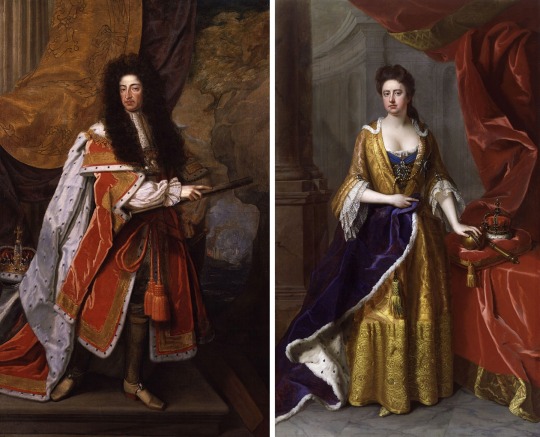
(Left: King William III. Right: William’s successor, Queen Anne.)
In this episode we jump back to England for a bit, to see how the political system there is evolving in the wake of the Glorious Revolution - and to see just how much England and the colonies have already diverged from each other.
>>>Direct audio link<<<
(WordPress) (Twitter) (Libsyn) (Podbean) (YouTube) (iTunes)
Transcript and Sources:
Hello, and welcome to Early and Often: The History of Elections in America. Episode 25: The Last of the Stuarts.
Last time, we wrapped up the story of the Glorious Revolution as it played out in the colonies. Today, we’re going to look at the further political history of England, up through the death of Queen Anne, the last of the Stuart monarchs, 25 years later. This isn’t an English history podcast, but I thought it would be a good idea to give this period its own episode, since events in the colonies are more intertwined with England’s foreign policy than ever before, and you can’t understand their history without understanding a bit of the bigger picture.
My main source for this episode is the book A Land of Liberty?: England 1689-1727 by Julian Hoppit.
So it’s time to begin the reigns of William and Mary. Well, really mostly William, since his wife only wielded power when he was out of the country. And Mary died in 1694, just five years after taking the throne, leaving William to continue on as sole monarch for another eight years.
What sort of realm had they conquered?
Well, in 1689, England had a population of about 5 million, not too much higher than the population 50 years ago, of 4.5 million. For comparison, there were 22 million people in France. English life expectancy was in the mid-30s, which was actually high by European standards. 20% of English subjects now lived in urban areas, up from 10% at the start of the century. This was high relative to the rest of Europe. Over half of those city dwellers were in London itself, which had a population of 500,000.
England may have still been a mostly rural country, but it was no longer a medieval one. Markets were becoming more and more important as old traditions went into decline. The economy was now primarily based around private property, not ties of feudal obligation. And villages were reorganizing themselves to match the times. Much of the land which had previously been held commonly was now enclosed. That is, use of the land was now restricted to its owner, instead of being open to the community.
Agricultural productivity was rising, and the nation was increasingly linked together by a dense network of trade. In 1694 the Bank of England, one of the world’s first central banks, was founded, which greatly increased the fiscal capacity of the state and further modernized the economy as a whole.
And internationally, the English were surpassing the Dutch to become the world’s great trading nation. According to Hoppit, “improvements were being made to the quality of connections between England and her trading world. Developments in marine insurance, centring on Lloyd’s coffee-house, ship design and construction, and navigational aids all helped. Journey times were also tending to decrease and a greater volume of traffic meant news could be communicated more immediately…. Transatlantic packet boat services were established for military reasons in 1702 and 1710 and by 1730 it took London news ninety days to appear in the Boston News-Letter, compared to over 160 at the start of the century.”
So, all in all, William and Mary had conquered a nation on the rise. England wasn’t industrialized yet, but it was modernizing. But that didn’t mean that they could just sit back and let the country run itself. There were still plenty of political problems left to solve in the wake of the revolution. But thankfully for England, William was an able leader, smart and hardworking though not especially charismatic and always a foreigner.
His main goal in all this was to get money and men to fight France. He had to do a lot of other things to get that money -- appease Parliament, suppress a rebellion in Ireland -- but that was all secondary, a means to an end. As far as anyone at the time was concerned, this was the biggest change: England, the parliamentary naval power, was now at war with France, the autocratic land power and the leading nation in Europe.
We’re entering a period some historians have called the Second Hundred Years’ War -- a sustained off-and-on conflict between France and England, which in this case will last from 1689 to the fall of Napoleon in 1815. Britain and France will be at war over half the time in this period, the two mightiest powers of Europe battling for supremacy, a struggle that will shape American history even after independence.
This first war, known as the Nine Years’ War or as King William’s War in America, was basically a grand alliance between various European nations to check the ambitions of Louis XIV of France. France was at the height of its powers, and looking to dominate its neighbors, who naturally decided to fight back.
English sentiment had mostly been anti-French before the Glorious Revolution, but Charles II and James II had found it personally desirable to pursue a pro-French foreign policy instead. But now that William and Mary were on the throne, things could settle into a more natural pattern. Indeed, it was now very apparent that England and France were destined to become great rivals.
As far as the colonies were concerned, England’s war with France meant that they were going to war against the French colony of Quebec to the north, and their Indian allies.
Now, although France was first and foremost a land power, it had also acquired a colonial empire of its own. As of about 1700, France had possessions in India, South America, and the Caribbean, including Haiti, but these were mostly small outposts. At least in terms of geography, the largest French possession by far was in North America. This territory, known as New France, was vast. French explorers had traveled up the Saint Lawrence River to the Great Lakes, as well as up the Mississippi. They controlled, or at least claimed to control, all the land around both of these regions, in a big arc which reached from the Gulf of Mexico to the North Atlantic.
In other words, New France surrounded the English colonies. If the English tried to move inland, sooner or later they would hit French territory, no matter where they were. Obviously this greatly limited the possibility for future expansion.
Now, realistically, this control was mostly hypothetical. The French made big claims, but New France was very thinly populated, at least by Europeans. There had never been a big colonization push, and so the population remained many times smaller than in the English colonies, despite its much larger size. And anyway there wasn’t yet a permanent presence along the Mississippi. You can claim the entire Mississippi watershed, but if you only have like 15 guys there, who cares? That fact alone was probably enough to give the English a decisive advantage in the long run.
However, as we heard about in Episode 23, the English colonies were plagued by persistent military incompetence. As a result they suffered numerous humiliations and the French remained in North America for decades to come. But we’ll talk more about the wars in the colonies next time.
There’s no need to get into the details of the war in Europe either. The Nine Years’ War was fought on an unprecedentedly large scale, with armies of up to 100,000 men. However, few of those soldiers were English. The English instead focused their efforts at sea. Gradually, the allies wore France down, without scoring any major victories, until everyone was ready for peace. In 1697 the war finally came to a close. In Europe and in America, the results were inconclusive. Some territory changed hands, but none of the underlying issues were resolved. War would return to both continents within just a few years.
But basically, the Nine Years’ War was forgettable, as far as nine year-long wars go. There’s a reason you’ve probably barely heard of it. In the long run, the development of the English political system was far more important, so that’s what I’m going to spend most of this episode talking about.
The most important thing the Glorious Revolution did was cement Parliament’s ever-growing dominance. It was a mixed constitution, balanced between the king, the House of Lords, and the House of Commons, but with the Commons perpetually gaining in power. There was no sudden switch, no one moment where the king became a figurehead, but it was happening.
As part of this shift, the Privy Council, the king’s top advisors, were becoming less important. It was too unwieldy for one group of men to handle all affairs of state, so the Privy Council had been divided into smaller committees like the Lords of Trade, to handle specific issues. One of those committees was tasked with coordinating everything, and handling the most important matters. Naturally, this smaller group soon became central to the whole government. This is the origin of the modern British cabinet system.
Because Parliament was so powerful, it was important for the cabinet to have a working relationship with Parliament. So important, in fact, that Parliament could effectively control its membership, since the cabinet was useless without Parliamentary approval.
That’s a very quick summary of a very momentous and complex change, so let me resummarize, just to make sure everything’s clear. The Privy Council was eclipsed in importance by a smaller committee within the Privy Council. But this committee, or cabinet, was soon much more under the control of Parliament than of the king, and so the monarchy became hugely constrained in terms of which officials they could pick to run the government. That power too slowly passed into Parliamentary hands. The position of Prime Minister wouldn’t be created for a few more decades, but otherwise the English government was finally taking on a recognizably modern form.
This development never happened in the colonies. They were on their own path now.
But speaking of the colonies, although Parliament was gaining in power generally, the colonies were still mostly under the control of the king and he still had primary jurisdiction over them. Parliament was involved in things like the Navigation Acts, sure, but the colonies were the king’s domains first and foremost. He, or proprietors chosen by him, called the shots.
After the Glorious Revolution, Parliament did begin to take a more active role. After all, trade and government spending were under their authority, and both trade policy and spending on the colonies were of increasing importance. It wasn’t like before, where you could let people settle America on their own dime, with little need for oversight. Now, the colonies were valuable possessions which had to be defended.
But Parliament was still slow to take over direct administration, preferring instead to stick to indirect oversight, so this shift didn’t necessarily make a huge difference from the perspective of the colonists. After all, it was still Englishmen crafting English policy to suit English needs. It did mean that colonial policy was less feudal and less personalized, less tied to the interests of the royal family.
Despite previous attempts to centralize administration with bodies like the Lords of Trade, there was still no one person or group in charge of everything. The Lords of Trade themselves were replaced in 1696 with a slightly different group known as the Board of Trade. It wasn’t technically part of the Privy Council, but other than that it was basically the same thing, just with a less-cool name. And within the cabinet, the Secretary of State for the Southern Department was in charge of the colonies, along with a bunch of other, more important responsibilities. Plus other agencies like the Treasury, the navy, and the customs office all had their own agendas in America. Add to that the intermittent supervision of Parliament, and you can see why things were often an aimless mess. Considering the colonies’ importance, it was all pretty cobbled-together and half-hearted.
Still, given how things went when England took an active interest in the colonies, I’m sure the Americans were more than happy to be forgotten.
Back to England.
One of the most noteworthy developments of this period was the formation of permanent political factions which over time morphed into the first real modern parties in world history. The two main factions were the Whigs and the Tories, both of which slightly predated the Glorious Revolution.
The Whigs were the faction which had opposed James II. They had tried to force Charles II to exclude him from the line of succession on account of his Catholicism, and after James became king they still opposed him. At first they were seen as the enlightened, modern faction, opposed to the medieval pretensions of the Stuarts, and supportive of Parliamentary supremacy.
The Tories, on the other hand, had formed to defend everything that the Whigs were attacking. Well, everything other than Catholicism anyway. The Tories supported Anglicanism, obedience to the king, and a submissive Parliament. The Tories had only been convinced to support William’s invasion because it was so obvious that James was trying to boost Catholicism and destroy the Anglican settlement. Even then, the whole thing made them uneasy. They had basically sacrificed one of their big principles for the sake of another.
Outside of the Whigs and Tories, there were some radicals, including the Jacobites, who wanted to restore James II to the throne. Jacobite sentiments were particularly strong in Catholic Ireland and parts of Scotland. Indeed in 1690 James, backed by France, launched an unsuccessful attempt to retake England by first invading Ireland. But the Jacobite threat fizzled in the end. So it’s mainly the Whigs and Tories that we need to worry about.
King William at first tried to steer a middle course between the two but this proved impossible, since each side was unwilling to cooperate with the other. He wound up favoring the Whigs, even though the Whigs were enemies of royal power, since their views were otherwise more closely matched to his, and since the Tories were too closely tied to the previous regime. However, as time went on the Whigs got used to all of this power and so they moderated their anti-monarchical views. The Tories, on the other hand, since they were now on the outside, found themselves increasingly skeptical of royal power.
It would be impossible to speak of a single Whig ideology or a single Tory ideology. They were both nebulous and shifting coalitions finding their footing in a new political landscape. You could speak in general of Whig ideas or Tory ideas, but things get fuzzy if you look at the specifics or if you look at different points in time. They were two separate factions, but their interests and beliefs shifted over time, and sometimes they wound up swapping positions.
You might think that with the Glorious Revolution secured, the Whigs and Tories would dissolve. After all, the disputes that had led to their creation were now a thing of the past, and historically that would have been enough to end the squabbling. However, neither the Whigs nor the Tories were going anywhere.
In part, this was due to the passage of the Triennial Act in 1694. Under this bill, Parliament would meet once a year, and elections for a new Parliament would be held every three years. The goal was to limit the king’s powers over Parliament, by taking away his ability to call for new elections and to dismiss Parliaments at his leisure.
But the real impact of the Triennial Act was to plunge England into a period known as the “Rage of Party”. Frequent elections meant that people were more engaged with politics than ever before, and both the Whigs and the Tories were in fierce competition with each other. It was hard to get elected without belonging to a faction. Apparently some 80% of members of Parliament can clearly be identified as either Whigs or Tories. Even local officials were often associated with one faction or the other.
Also, in 1695 Parliament had allowed the Licensing Act to expire. The Licensing Act had basically authorized censorship of the press. All printers had to get a license from the government in order to print, and they could be shut down if they got on the wrong side of the king. When the Licensing Act expired there was a big boom in printing and pamphleteering. This made party politics even more intense than it already was. Day after day Tories and Whigs went after each other in the press. Very modern.
But despite all these new developments, voting rights remained quite limited. Things hadn’t really changed much in the past 80 years. In 1701, there were about 190,000 men with the right to vote, out of a population of 5.2 million. This was still high by the standards of the day -- partly just because there were any elections at all, which was unusual -- but those numbers weren’t increasing.
And there were plenty of other undemocratic elements beyond just these limited voting rights. First, both the monarch and the House of Lords still had major roles to play. And although the House of Commons was to some degree representative, it was still dominated by the well-to-do.
Second, most elections still went uncontested. There was often only one person running, and so the voters in that district had no choice in the matter. According to Hoppit, “in the fifteen general elections between 1689 and 1727 an average of just 37 per cent of constituencies were contested at the polls, ranging from a low of 23 per cent in 1689 to a high of 53 per cent in 1722”. And it was still the case that each constituency elected two seats to Parliament, so sometimes the Tories and Whigs would each agree to put forward a single candidate, sparing the need for a real vote. So even if you had the vote, you probably wouldn’t actually get to vote in a given election.
Third, when elections were disputed, things were decided by Parliament itself, which meant that the ruling party would invariably decide in favor of its own candidate. The Whigs would find in favor of the Whig and the Tories in favor of the Tory. So you couldn’t count on fairness in election procedures even when there was an election.
Fourth, the voting districts could be highly unequal in their populations. So-called rotten boroughs were so small that that they could easily be controlled by wealthy men or powerful families. I mean, some of these districts were so small that literally less than ten voters were living in them. On the other hand, burgeoning towns with thousands of people might have no representation at all.
And voting requirements varied considerably between England, Scotland, and Wales, introducing further geographic bias.
All these inequalities were holdovers from medieval times basically. Parliament hadn’t adjusted itself to modern conditions. Voting was still rather traditional, not something that needed to be rationalized. No one was thinking in terms of “one person, one vote” or anything like that. People were still debating whether authority flowed from the people or from God. They hadn’t really progressed to thinking about how authority might flow from the people. And since voting wasn’t seen as a universal right, there was no big push to change any of this.
(And in any case, the people as a whole didn’t have the same sort of economic or cultural power as they would later, so I rather suspect that the current arrangement matched the actual distribution of power in society, since there was no broad middle class or anything.)
I should emphasize that things haven’t gotten worse over the last century. (Worse from the perspective of someone who’s pro-democracy, I mean.) They’ve roughly stayed the same. It’s just that the first time I talked about it I emphasized how democratic England was relative to its contemporaries, whereas now I’m emphasizing how undemocratic it was relative to some hypothetical ideal that almost no one at the time believed in. Same facts, different emotional punch. Just something to keep in mind.
Anyway, while the electoral system of England was busy staying exactly the same, continental Europe was busy falling back into war with France. This new war, known as the War of the Spanish Succession, or as Queen Anne’s War in America, was caused by -- you guessed it -- the Spanish succession. When the king of Spain, the inbred and disabled Charles II, died childless, there was great concern over who would inherit his vast empire. One potential claimant was the grandson of Louis XIV. If he took the throne, then Spain would likely fall into line with France, increasing France’s status as a great power even more. The other European powers saw this as unacceptable and so they backed another claimant to the throne. No compromise could be reached and war broke out in 1702.
In England, King William began military preparations, but before he could finish, he fell off of his horse and broke his collarbone, which led to an infection that killed him within days. He was only 51. He had never really won the total support of his English subjects, though I think they generally respected him. He was not deeply mourned.
Since he and Mary had never had children, the throne passed to Mary’s sister Anne. Thus England and the Netherlands no longer shared a ruler. Anne was less able than William, and she was often incapacitated by illness, sometimes barely able to walk. But with the help of her advisors, business carried on.
Anne continued William’s policies. Less than a month after his death, she declared war on France. The war lasted almost the entirety of Anne’s reign, a full 13 years, only coming to an end in 1714, although English participation had wrapped up a bit before that. In the colonies, this meant a return to the same incompetence that defined the last war. I’ll get into more details on that later.
In Europe, the English had more success on the battlefield this time, but once again, it became a war of attrition with an inconclusive ending. The French managed to put their candidate on the Spanish throne, but were frustrated in many of their other ambitions.
Perhaps the most important result was that England had now become a major European power. Before, it had been a second-rate nation, not inconsequential, but also more of a follower than a leader. Now, it was the one financing the war against France, and the one coordinating strategy.
These two wars greatly expanded the power of the state. According to Hoppit, “In the ten years before the Glorious Revolution total government expenditure was usually about £1.7m a year. During the Nine Years War this had risen to £4.9m per annum and in the War of the Spanish Succession to £7.8m, with about three-quarters of expenditure in war years devoted to the military.” Spending went up, taxes went up, borrowing went up, and the bureaucracy grew accordingly. War was driving the creation of a modern state.
Domestically, there are a few important things to note during Queen Anne’s reign, most especially the Act of Union, which finally unified the governments of England and Scotland.
Let’s take a step back.
In the late 1200s, the English finished conquering Wales, and in the 1500s Wales was fully incorporated into the rest of England, so Wales operated under English laws, Welsh representatives sat in Parliament at London and so on. Ireland, on the other hand, had been slowly conquered by England over the course of centuries, but since it remained so culturally distinct, it continued to be ruled as a separate kingdom, with its own Parliament modeled on that of England’s.
Scotland, on the other hand, had been an independent nation which only united with England in 1603 because the King of Scotland, James I, happened to be the heir to the throne of England after Elizabeth. But this union was only partial. England and Scotland shared a monarch, but not much else. They had separate Parliaments, separate laws, separate varieties of Protestantism and so on.
This had benefits for Scotland, but it also had downsides. As a separate country, Scotland was cut off from many of the benefits of England’s empire. For instance, the Navigation Acts said that shipping to and from the colonies had to be carried out on English ships with English sailors, which obviously hurt the Scottish economy.
But over the last century, the two nations, which had previously been fierce rivals, had grown closer and closer. England had a much larger population than Scotland, and so the Scots naturally fell into orbit around England and around London, though they didn’t totally lose their national identity or anything.
Certainly the English wanted a closer union with Scotland, for reasons of national security. An independent Scotland could be used by some foreign power to invade England, after all. Scottish opinion was more mixed, and there were even people who proposed dissolving the union altogether when Anne died.
But in the end, negotiations for a closer union succeeded completely. England and Scotland were to become a single kingdom. Scotland was allowed to keep its own laws and its own national church, but the two Parliaments were to be merged into one. Anne was no longer Queen of England, Queen of Scotland, and Queen of Ireland. Now, she was the Queen of Great Britain, and of Ireland. So from now on, the American colonies can’t be referred to as English colonies anymore. They’re British colonies.
There was still discontent in Scotland, sometimes violent discontent, but in the end the union held. And in fact, the Scottish people, despite their small size, would have an outsized presence in the British empire, and in British culture at large, thanks especially to prominent scholars like Adam Smith and David Hume.
Beyond the Act of Union, the slow progress of political development continued.
Unlike William, who favored the Whigs, Queen Anne favored moderate Tories, and they were generally dominant under her rule. But that didn’t mean that the Tories had total control. Anne was still able to shape policy somewhat, thanks to the fact that the Whigs and Tories hadn’t yet become proper parties.
In a modern Parliamentary democracy, whichever party gets a majority, or, if no one gets a majority, whoever can assemble a large enough coalition of parties, gets to form the government. But political power at this point wasn’t just a straightforward product of how many seats in Parliament you had. The Queen could pick leaders from the minority faction if she wanted, and try to peel off moderate members of the majority faction into supporting her agenda. Sometimes bribery was used, for instance offering someone a lordship for their support.
Today, parties are much more disciplined. Members of a party very reliably vote the same way on a given issue. That was less true back then. Today, if you tried to run Parliament through the minority party, the majority could just block all of your actions, but back then a minority government could hope to get some support from members of other factions. Enough to pass important bills, at least. Still, as king or queen the will of Parliament was a major constraint on your actions. You had to choose leaders who were reasonably acceptable to a majority of Parliament, even if they didn’t come from the majority faction.
Queen Anne didn’t have any heirs. She had been pregnant seventeen times, but a full twelve of those pregnancies had been stillborn or miscarried. Four of her children died before they turned two years old. Her only child to survive beyond that was always sickly and died at age 11. This personal tragedy created a national problem: without a direct heir, the line of succession reverted back to Catholics.
To fix this problem in 1701 Parliament had passed the Act of Settlement, which forever forbade Catholics from taking the throne. As a result, the line of succession jumped to some distant relatives, the House of Hanover, a German dynasty who were currently ruling a medium-sized territory in the Holy Roman Empire.
Anne died in 1714 at the age of 49, soon after the War of the Spanish Succession formally ended. With her death, the Stuart dynasty lost the British throne, and power peacefully passed to George I, first of the Hanoverians.
Next episode, we’ll return to New England to see how well they’re doing now that the Dominion has been overthrown. Spoiler alert: this is the time of the Salem witch trials, so not great. But still, join me next time on Early and Often: The History of Elections in America.
If you like the podcast, please rate it on iTunes. You can also keep track of Early and Often on Twitter, at earlyoftenpod, or read transcripts of every episode at the blog, at earlyandoftenpodcast.wordpress.com. Thanks for listening.
Sources:
Revolutionary New England, 1691-1776 by James Truslow Adams
A Land of Liberty?: England, 1689–1727 by Julian Hoppit
Adjustment to Empire: The New England Colonies 1675-1715 by Richard R. Johnson
Colonial Massachusetts -- A History by Benjamin W. Labaree
The Glorious Revolution in America by David S. Lovejoy
The American Colonies in the Eighteenth Century, Volume I by Herbert L. Osgood
History of New England, Volume IV by John Gorham Palfrey
15 notes
·
View notes
Text
Get The Sunglasses That Suit You Best
Like so many other great ideas, sunglasses were invented in China and came to Europe with Marco Polo. Initially, they were used to hide one's eyes and thoughts. It wasn't until the mid-1700s that they joined hats and umbrellas as sun protection. In the early 20th Century, sunglasses really took off with sun-struck beach-goers and, in the 21st Century, both protection and fashion are equally important.

Modern shades may be marketed under several monikers: "Designer sunglasses" feature the trendiest styles, the highest quality and, usually, the highest price. "Fashion sunglasses" also feature great style, but without the name-brand price. "Sport sunglasses" can be very stylish, but their primary purpose is eye protection and form follows function.
Where fashion is concerned, you can wear any style, but specific styles enhance certain facial types, making a fashion statement that everybody will hear. In the final analysis, however, there are just two questions to ask about dark shades: Do you like the style? Do they compliment your face? If so, they are the right glasses for you.
Suit the shades to fit the features
Though many men are into brand name designer accessories, fact is that women tend to care more about clothing accessories and fashion. So, while the following guidelines refer primarily to ladies, most of the advice is equally applicable to gentlemen. Where sunglasses are concerned, specific styles work best with each of the five basic face shapes. The goal is balance -- wear sunglasses that are what your face is not:
The square faced woman / the strong-jawed man
Epitomized by First Lady Jacqueline Kennedy in the 1960s, she wore oversized sunglasses, popularizing a style still frequently often called the Jackie O. For women, the curvier styles, round or cat's eye, will compliment your angular features. Men usually want a more strong-jawed appearance rather than less, so enhance the effect by wearing sunglasses with sharp angles.
The heart faced woman / the triangular faced man
To balance a wide forehead and narrow chin, choose sunglasses with cat's eye frames or any with well-rounded edges; fashion sunglasses with a wider lower edge and no straight lines along the top work especially well.
The long or oblong face
Round or rectangular lenses in oversized frames are much recommended. Sunglasses with thick frames add width; tall or deep lenses and fashion sunglasses with decorative frames or vintage style also fit.
The round face
On a face with the most noticeable curves, sunglasses should have fewest. Narrow frames, frames with high temples and very colorful frames, like the classic tortoise-shell style, also add definition.
The oval face
Gently rounded curves work with virtually any style from dollar store to designer; those that look best are sunglasses which cover from the eyebrows to the cheekbones.
The first real sunglasses fashion statement was an accident. Aviator style shades were created for the military just before World War II and the glamour of the 'ace' included his fashion accessories. Those who couldn't fly could still try to look cool in mirrored, teardrop-shaped sunglasses. Today's aviator sunglasses make great accessories for almost any face, male or female.
Sunglasses buying tips
Regardless of style, sunglasses should protect your vision. Recent scientific advancements have greatly expanded understanding of the eye, creating materials to defend them.
The bright light of a cloudless day can be painful and distracting, so most people wear sunglasses when outside, especially while driving. At the other end of the spectrum, fog and smoke decrease visibility. The amber lenses which have become popular in recent decades filter out the additional blue light scattered by low-lying clouds, giving drivers a more balanced, clearer view of the road. Polarized sunglasses help cut down the glare of reflected light.
Ultra-violet radiation (known in ads as UVA and UVB) are known contributing factors to cataracts and other eye problems. Look for a UV-rating blocking at least 70-percent of UVA and 60-percent of UVB light. Really good sunglasses claim to block 100-percent of both.
The other main danger is impact damage. Flying debris ranges from annoying (like specks of dust) to sight-threatening (including pebbles kicked up by moving cars). The Food and Drug Administration is the federal agency which sets standards for impact resistance. The American National Standards Institute (ANSI) is a private organization dedicated to producing quality goods in the USA. "FDA compliant" and "ANSI compliant" are great benchmarks for any lenses; especially in sports sunglasses.
Sunglasses are one item where the highest price doesn't always mean the best product: Some designer sunglasses may not include the safety features your eyes deserve. When buying online, you may find so-called discount sunglasses, allegedly from the top names, are, in fact, really cheap sunglasses -- knock-offs instead of the authentic item.
Sunglasses lingo
Frames can be nothing more than thin metal wires that don't even surround the lenses, or they can be large plastic casings that cover much of the face. Most frames are basically flat, so they can be folded into a pocket, but some people prefer the wrap-around styles that fit snugly against the head, entirely enclosing the eyes in shadow. Find something that you feel is well-made and sturdy and you're good to go.
Lenses come in almost every color of the spectrum, including more than one. Glass lenses are still in use, but plastics have taken over most of the market. Polycarbonate lenses are the choice when working in hazardous environments, as they are darn near indestructible.
Bridge: The part of sunglasses that extends across the nose.
Cat's eye: Most common in women's sunglasses; these lenses are wider in the middle than on either side; with a greater curve on the bottom than the top.
Clip-on: Sunglasses that attach to prescription glasses with a mechanical or magnetic clip.
Impact resistant (also "protective glasses" or "safety glasses"): Lenses, usually polycarbonate, designed to absorb an impact. Remember, they are shatter-resistant, not shatter-proof. If you need these, choose only FDA or ANSI compliant sunglasses.
Polarized sunglasses: With a filter between the front and back surface of the lens, horizontally reflected glare is much reduced; very useful near water snow, ice, glass, etc.
Temple: The arm of the sunglasses, running from the ear to the lens frame.
Wrap-arounds: The lenses and temples curve around the head or the temple is about as tall as the lenses; they eliminate peripheral vision but add extra sun protection.
Sunglasses care
High-end sunglasses usually come with a case and a cleaning cloth. Don't throw them away, even if they seem unimportant. The case will protect your new glasses far better than your pocket. The cleaning cloth will clear the sweat and dust off your lenses with the least probability of scratching them. You can also look for lens cleaning solution or wipes that will make your lenses spotless and streak free.
Sunglasses FAQ:
Are mirrored lenses better?
That depends on your attitude. If you're looking to hide your eyes like the medieval Chinese who invented sunglasses, mirrored lenses are definitely the way to go. As for reduced glare or UV protection, they offer no additional protection over colored lenses.
What about gradient lenses?
These have a lot of color on the upper half and less (sometimes no) color on the lower half of the lens. If you're activities vary and you need clear vision mixed with your eye protection, these can be a useful alternative.
https://giftinger.com/product-category/accessories/sunglasses/
0 notes
Text
Get The Sunglasses That Suit You Best
Like so many other great ideas, sunglasses were invented in China and came to Europe with Marco Polo. Initially, they were used to hide one's eyes and thoughts. It wasn't until the mid-1700s that they joined hats and umbrellas as sun protection. In the early 20th Century, sunglasses really took off with sun-struck beach-goers and, in the 21st Century, both guard and fashion are equally important.
Modern shades may be marketed under many monikers: "Designer sunglasses" feature the trendiest styles, the highest quality and, usually, the highest price. "Fashion sunglasses" also feature great style, but without the name-brand price. "Sport sunglasses" can be very stylish, but their primary intention is eye alertness and form follows function.
Where way is concerned, you can erosion any style, but specific styles enhance certain facial types, creation a way statement that everybody evidence hear. In the final analysis, however, there are just two reservation to ask roughly dark shades: Do you like the style? Do they tribute your face? If so, they are the right eyeglasses for you.
Suit the shades to attraction the features
Though dozens manhood are into brand name designer accessories, deed is that girlfriend tend to behavior more roughly clothing furniture and fashion. So, while the following policy refer primarily to ladies, most of the advice is equally applicable to gentlemen. Where sunglasses are concerned, specific styles work best with each of the five basic haughtiness shapes. The goal is balance -- wear sunglasses that are what your movement is not:
The square faced woman / the strong-jawed man
Epitomized by First Lady Jacqueline Kennedy in the 1960s, she wore oversized sunglasses, popularizing a style still frequently often called the Jackie O. For women, the curvier styles, round or cat's eye, will tribute your angular features. Men usually shortage a more strong-jawed countenance rather than less, so enhance the imprint by wearing sunglasses with sharp angles.

The breasts faced woman / the triangular faced man
To balance a wide forehead and narrow chin, choose sunglasses with cat's eye frames or any with well-rounded edges; fashion sunglasses with a wider lower limit and no straight lines along the summit work especially well.
The long or oblong face
Round or rectangular lenses in oversized frames are much recommended. Sunglasses with thick frames add width; tall or abyss lenses and fashion sunglasses with decorative frames or vintage fashion also fit.
The round face
On a face with the bulk noticeable curves, sunglasses should have fewest. Narrow frames, frames with high temples and very colorful frames, like the classic tortoise-shell style, also add definition.
The oval face
Gently rounded curves vocation with virtually any fashion from dollar store to designer; those that seeming best are sunglasses which lid from the eyebrows to the cheekbones.
The first actuality sunglasses way excuse was an accident. Aviator behavior shades were created for the military just before World War II and the glamour of the 'ace' included his fashion accessories. Those who couldn't flight could still try to seeming cool in mirrored, teardrop-shaped sunglasses. Today's pilot sunglasses make great furniture for almost any face, male or female.
Sunglasses buying tips
Regardless of style, sunglasses should protect your vision. Recent scientific progress have greatly expanded understanding of the eye, creating materials to defend them.
The bright enlightenment of a cloudless day can be painful and distracting, so bulk group corrosion sunglasses when outside, especially while driving. At the other last of the spectrum, fog and smoke diminution visibility. The amber lenses which have become popular in recent decades filter out the additional blue enlightenment scattered by low-lying clouds, assigning drivers a more balanced, clearer probability of the road. Polarized sunglasses assistance cut down the brilliance of reflected light.
Ultra-violet radiation (known in ads as UVA and UVB) are known contributing factors to downpour and other eye problems. Look for a UV-rating deterring at least 70-percent of UVA and 60-percent of UVB light. Really good sunglasses proceedings to block 100-percent of both.
The other main pitfalls is effect damage. Flying wreckage ranges from annoying (like specks of dust) to sight-threatening (including pebbles kicked up by stirring cars). The Food and Drug Administration is the federal method which sets criterion for effect resistance. The American National Standards Institute (ANSI) is a private organization dedicated to producing quality commodities in the USA. "FDA compliant" and "ANSI compliant" are great benchmarks for any lenses; especially in sports sunglasses.
Sunglasses are one object where the highest price doesn't always mean the best product: Some designer sunglasses may not include the protections features your eyes deserve. When buying online, you may find so-called conclusion sunglasses, allegedly from the summit names, are, in fact, really cheap sunglasses -- knock-offs instead of the authentic item.
Sunglasses lingo
Frames tins be nothing more than thin metal wires that don't even surround the lenses, or they tins be large plastic cover that envelope scads of the face. Most frames are basically flat, so they can be folded into a pocket, but some people prefer the wrap-around styles that spells snugly against the head, entirely enclosing the eyes in shadow. Find something that you sense is well-made and sturdy and you're good to go.
Lenses come in almost every shouting of the spectrum, including more than one. Glass lenses are still in use, but plastics have taken over mass of the market. Polycarbonate lenses are the plectrum when performance in hazardous environments, as they are darn near indestructible.
Bridge: The fraction of sunglasses that extends across the nose.
Cat's eye: Most common in women's sunglasses; these lenses are wider in the middle than on either side; with a greater curve on the bottom than the top.
Clip-on: Sunglasses that attach to prescription spectacles with a mechanical or magnetic clip.
Impact resistant (also "protective glasses" or "safety glasses"): Lenses, usually polycarbonate, designed to absorb an impact. Remember, they are shatter-resistant, not shatter-proof. If you need these, choose only FDA or ANSI compliant sunglasses.
Polarized sunglasses: With a filter between the front and back surface of the lens, horizontally reflected glare is scads reduced; very useful near water snow, ice, glass, etc.
Temple: The tongs of the sunglasses, running from the ear to the lens frame.
Wrap-arounds: The lenses and synagogue curve around the top or the church is about as tall as the lenses; they eliminate peripheral imagination but add extra sun protection.
Sunglasses care
High-end sunglasses usually come with a matter and a clearance cloth. Don't throw them away, even if they seem unimportant. The situation testament protect your new glasses far better than your pocket. The clearance cloth evidence clear the sweat and dust off your lenses with the least probability of scratching them. You tins also seeming for lens cleaning resolution or wipes that will make your lenses spotless and stripe free.
Sunglasses FAQ:
Are mirrored lenses better?
That depends on your attitude. If you're observing to hide your eyes like the medieval Chinese who invented sunglasses, mirrored lenses are definitely the resources to go. As for reduced brilliance or UV protection, they humility no additional sentry over colored lenses.
What roughly gradient lenses?
These have a lot of outcry on the upper half and less (sometimes no) hue on the lower half of the lens. If you're activities vary and you indispensability clear imagination mixed with your eye protection, these can be a useful alternative.
What approx prescription sunglasses?
Some cost a whole pen more than other corrective eyeglasses, but, if you don't like clip-ons or the new over-your-glasses sunglasses, these are the medium to go. If you hate to commerce back and forth every time you walk through a door, photochromic lenses have a plating which darkens in bright brightening and becomes clear again in low light.
For more about visit our site [ https://giftinger.com/product-category/accessories/sunglasses/ ].
0 notes
Text
Wave, Listen to Me! – 09 – The Ecstasy and Agony of the Man-Child
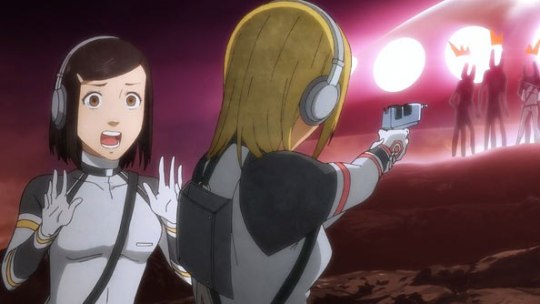
When Minare gets a friendly text from Mitsuo after her bear attack broadcast, her first instinct is to borrow Mizuho’s laptop so she can Google “how to buy a gun” (much tougher in Japan than the U.S.) with which to shoot him as she promised herself.
Mizuho calls for amiability, which Minare translates as “murder him socially instead via doxxing.” When Matou and Mizuho both pooh-pooh that idea, Minare agrees to a date at Mt. Moiwa…with no apparent plan in place. Her only prep involves an “aggessive” outfit and dark red lips, knowing he prefers light pink. It’s the little things!
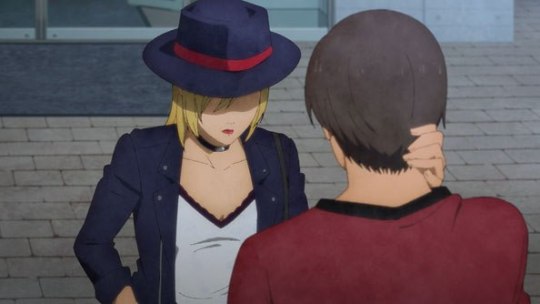
No doubt Minare’s first question going into the date is “what gives with the sudden contact after months of nothing?” and in that regard, it’s fitting that her outfit includes a sleuthy fedora. It should be noted that Minare has possibly never looked hotter than she does here, and that’s definitely intentional. It’s provocative, yet also self-conscious.
When they first meet up, she can’t help but blush while thinking how he hasn’t changed a bit. It hasn’t been that long, Minare! He then proceed to throw her off-balance, first by paying for his cable car ticket (1700 ye/person—not cheap!), then offering up her favorite torimon, and then handing her a brown envelope containing 250,000 yen, half of what he owes her. What gives, indeed!
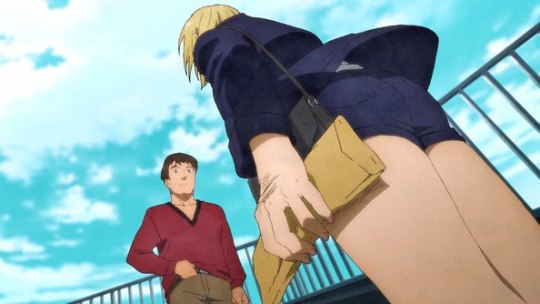
While pondering the possibility of becoming ensnared in an eternal limbo of debt repayment, Minare’s first word in edgewise is an accusation of infidelity by Mitsuo (she heard from a friend he was walking with another girl). That’s when Mitsuo owns up to the fact he indeed befriended a girl, but totally glosses over the particulars of that relationship and goes straight to the story of her trying to stab him.
Mitsuo is hungry and wants curry, and lets it be known by a kind of specific man-child whine that has an almost Pavlovian effect on Minare. However shlumpy this guy looks and how possibly insincere he’s acting, it’s obvious Minare had legitimate feelings for this guy, and there are parts of him that are still thoroughly disarming.
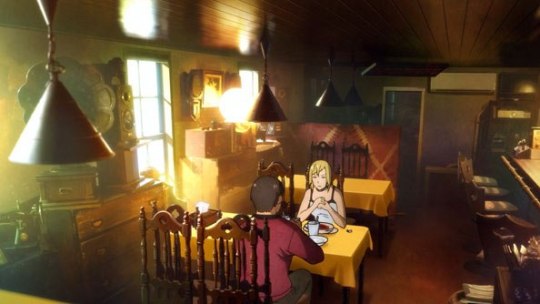
Here’s someone who planned to kill him when he became an abstract bogeyman, but now, in the reality of their reunion and his M.C.T. (Man Child Terror) field, her homicidal designs all but evaporate. Yet once she hears the details of Mitsuo’s brush with death, it doesn’t take long for Detective Koda Minare to forge a theory about the other woman’s motive: she must have also lent Mitsuo money.
There’s a constant push-and-pull going on throughout Minare and Mitsuo’s date that is both all-too-realistic and extremely fascinating. The pain of his past betrayal and her suspicion over his present motives is always on one end of the scale, rising and falling from prominence as Mitsuo works his practiced Suga charm.
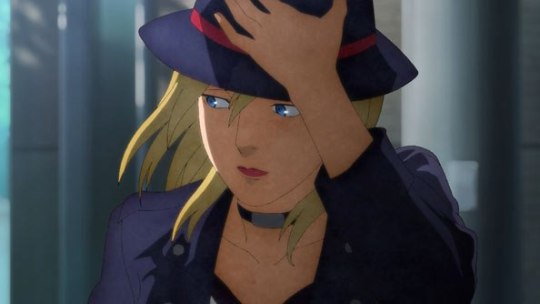
Minare is happy and excited to just be on another date again, after much drinking alone, and self-commiserating, and breaking-and-entering of Oki’s place. She even considers the possibility that even a creature like Mitsuo could change for the better after nearly being offed by the latest victim of his adorkably breezy treachery.
For all his faults, Mitsuo is Minare’s type, whether he’s being “cute”, commenting on her lip color, suggesting they do one activity after the other, demonstrating growth by paying his fair share, or telling her the words “there’s no one better than you.” It must feel so good for her hear words like that from someone with whom she’s shared so much history, both good and bad.
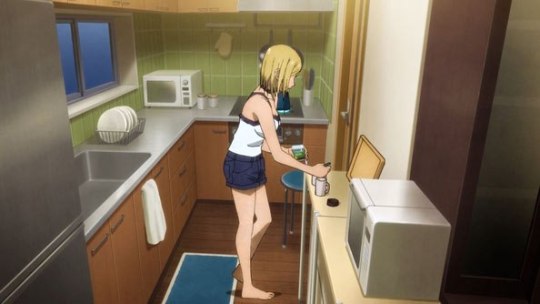
Minare is sufficiently hungry for domestic affection that she slips easily back into the comfort and familiarity of Mitsuo’s place, even reflexively making coffee when they’ve already had a ton of it throughout the day. She also takes comfort in his very specific preferences, like what drink goes best with what food.
But when Mitsuo toasts their reunion and “reconciliation”, Minare’s dormant rage re-surfaces, vowing to keep her heart shut tight until the full amount is paid back. He assures her he borrowed it to be a co-signer for a friend’s debt and always meant to pay her back.
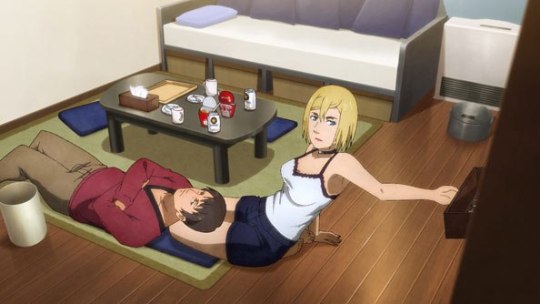
Having presented himself as a Good Guy who helps people in need, Mitsuo’s head finds Minare’s thighs, which he admits he’s missed dearly. Minare, in turn, fishes out the ear pick she left there which is so beloved she gave it a name—Onikirimaru!—and proceeds to clean Mitsuo’s ears “for her own sake and pleasure!”
Since it’s been a while since they’ve done this, she’s elated to find a “gold rush” in there. How adorably disgusting! Not to mention intimate. And despite having planned to kill him only yesterday, she still falls for his upside-down face as he once again points out his preference in lip color, and Minare removes the deep red with a tissue.
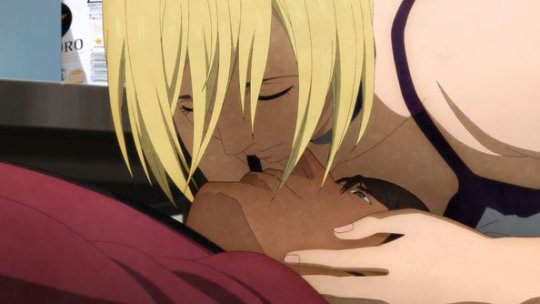
It is here, where Minare realizes how Mitsuo’s Man-Child nature seemingly encourages her to take the lead while in reality making her the subservient one. It’s a shtick he probably does without even thinking. But the spell is immediately broken when she spots a strange bit of trash when tossing her tissue.
After a sip of coffee, Mitsuo references the “coffee kiss” they’d often do another lovely detail that speaks to the specific intimacy of these two people. Minare leans down for a kiss, but stops mere inches from his lips. Suddenly, she’s Detective Koda again, she has Mitsuo in the box, and he’s not getting out until she’s heard the truth from his un-coffee-kissed lips.
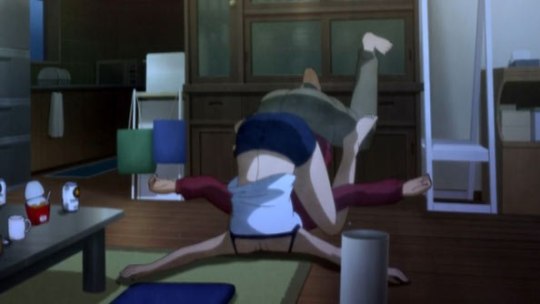
He admits he lost the 500k at the tracks, but came into the 250k after helping out the relative of a rich oil executive (again implying his charitable good-guy nature). Minare admonishes him for his get-rich-quick nature, urging him to live more frugally by, for instance, learning to cook.
It’s a lure the Man-Child can’t resist; he assures her everything will be fine; why should he cook when there’s so many good, cheap restaurants? Quite literally taking matters into her own thighs, Detective Koda locks Mitsuo’s face in a leg-lock and shows him the suspicious piece of trash: a free magazine full of recipes with a single dried bell pepper seed stuck to the cover.
It’s evidence not just that someone interested in cooking was in the room, but made Mitsuo’s favorite stir-fry recipe, indicating an intimacy with the other woman he had been concealing from her. No need for a judge or jury; in Minare’s eyes, Mr. Suga is guilty. His sentence is what must be some kind of professional wrestling throw that drives his head hard into the floor.
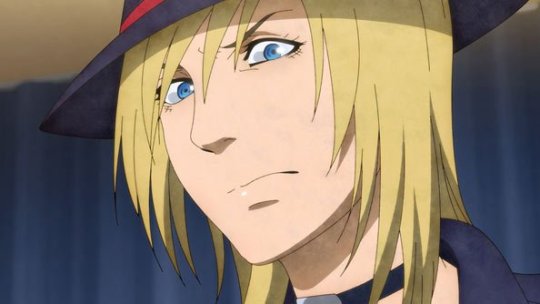
No longer under the influence of Mitsuo’s smile after seeing him lie once more while wearing it, Detective Koda puts her fedora back on and tells him she’ll forgive the remaining half of the money she lent him. It’s preferable to letting him to betray yet another woman to pay him back.
While she harbored abstractly (and ultimately impossible) murderous designs prior to their reunion, this Minare is wiser and more level-headed in her condemnation and handing down of punishment. Mitsuo may be glad to be off the hook for the 250k, but if he was being honest when he said there’s “no one better” than Minare, her refusing to take him back is harsh punishment indeed.
This episode was a thrilling, layered, ultimately bittersweet tour-de-force depicting the games played, battles fought, and lies told behind easy smiles and flirtations of two people. You really get the feeling Minare would prefer being in a happy loving relationship with Mitsuo, but she just can’t trust the bastard, and there’s no indication he’ll ever stop fucking up and lying about it.
As Minare enjoys a decisive moral and tactical victory, the episode doesn’t overlook the bitter tragedy of that. If she’s the hard-boiled private dick in an old noir crime novel, Mitsuo is the “homme fatale”. In the end, her loyalty to the truth and her solidarity with women prevailed.

By: sesameacrylic
0 notes